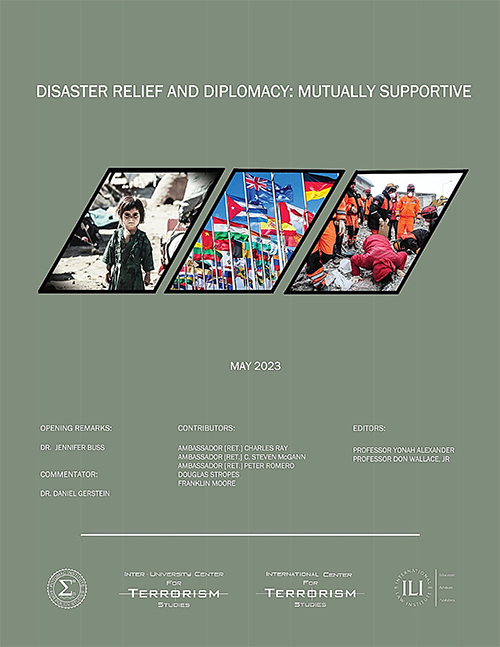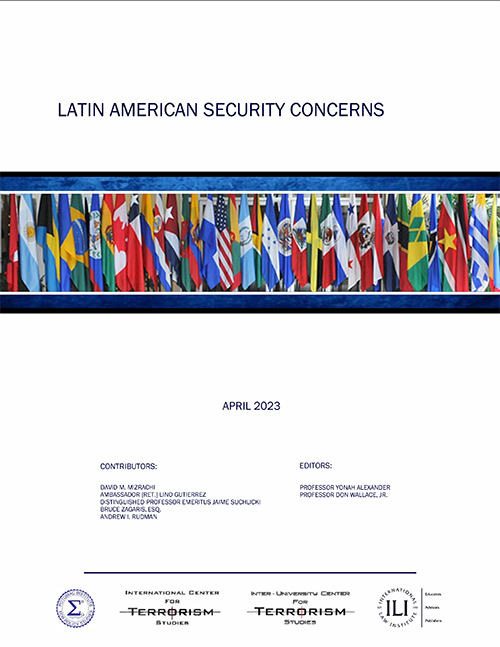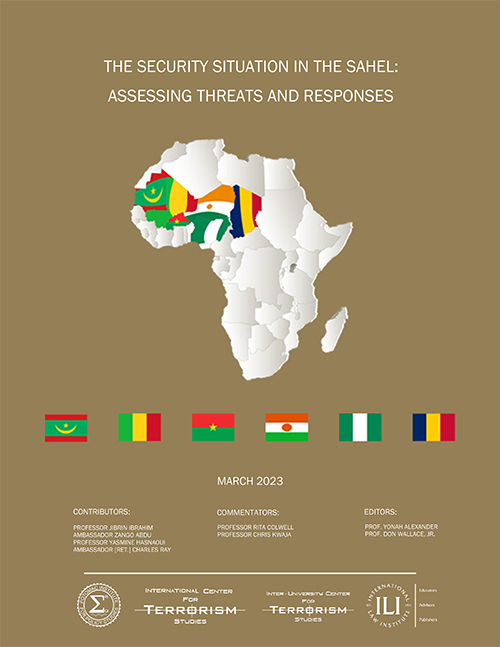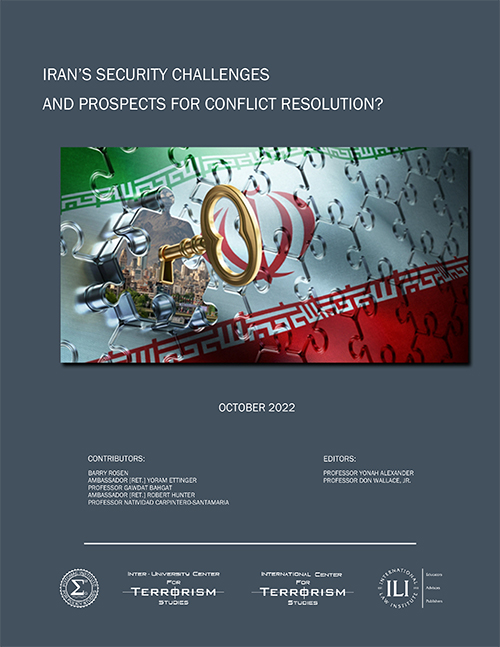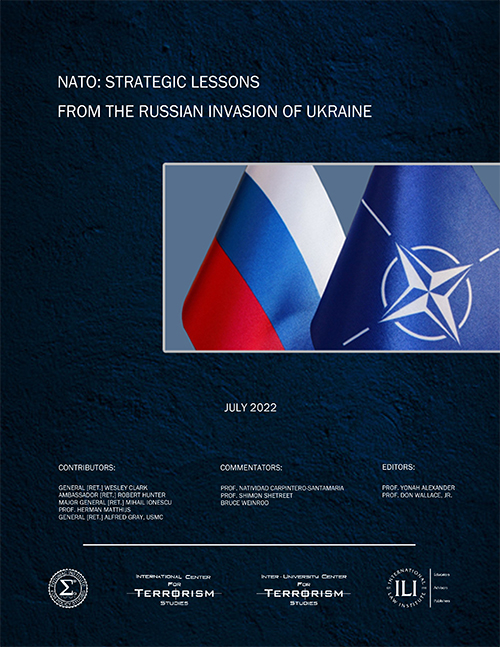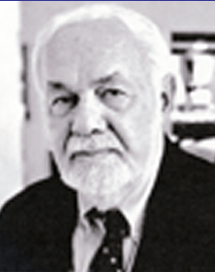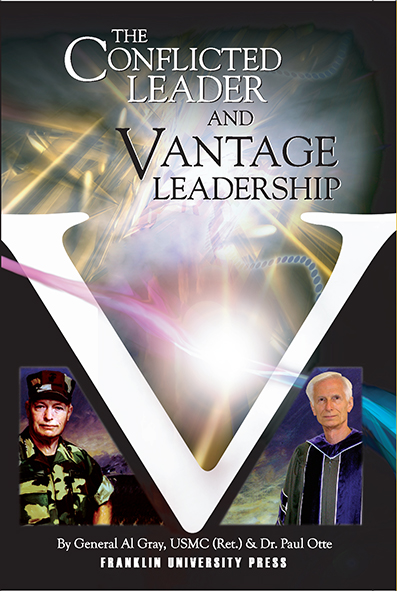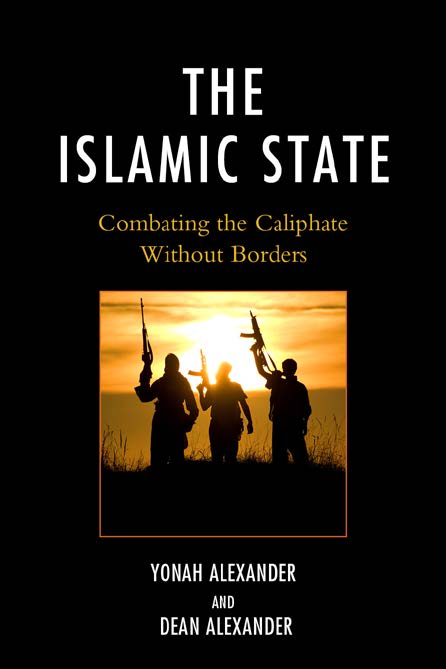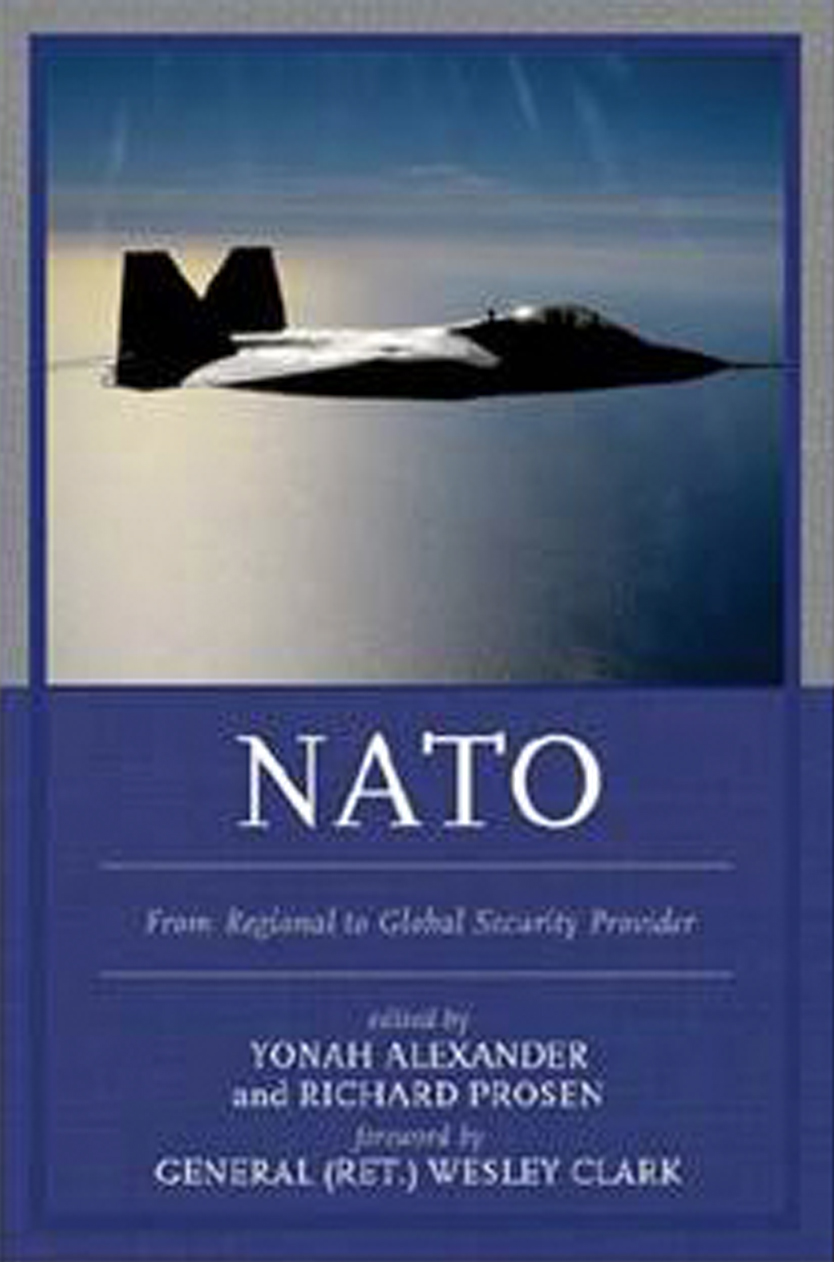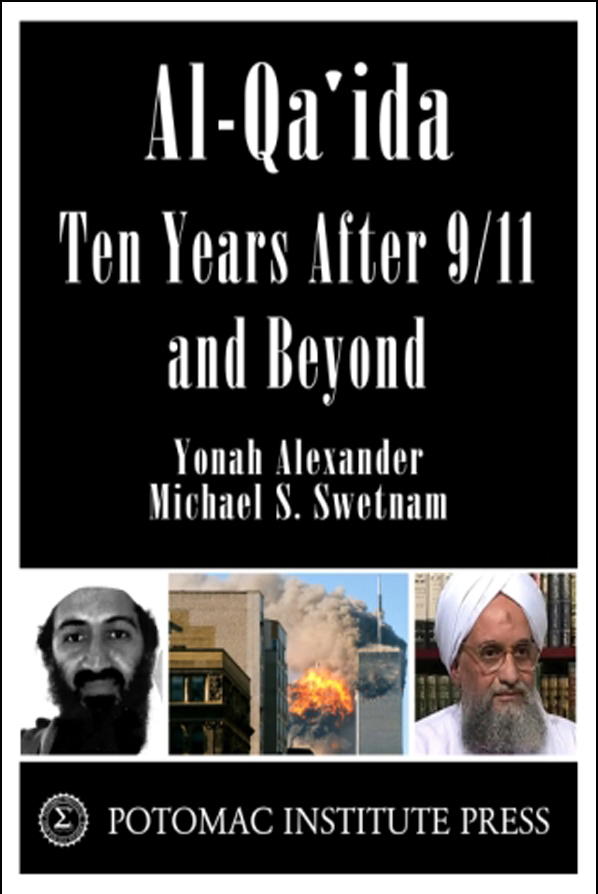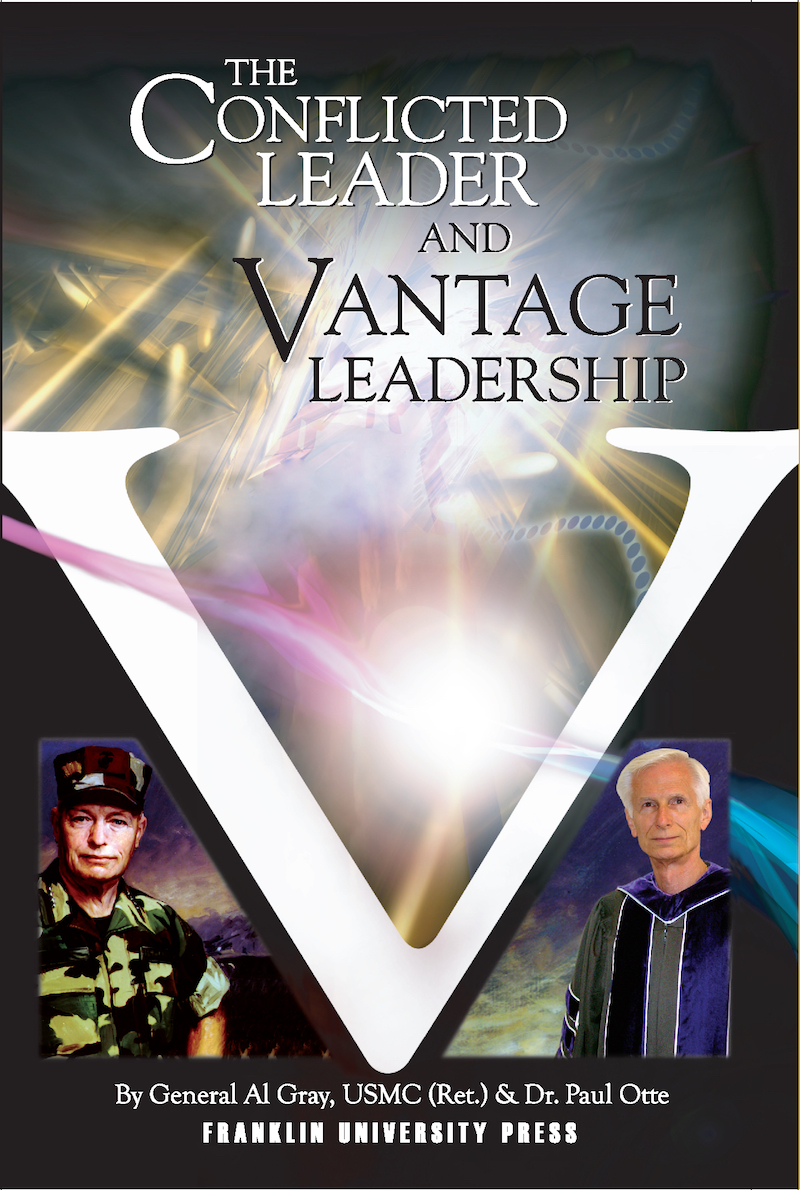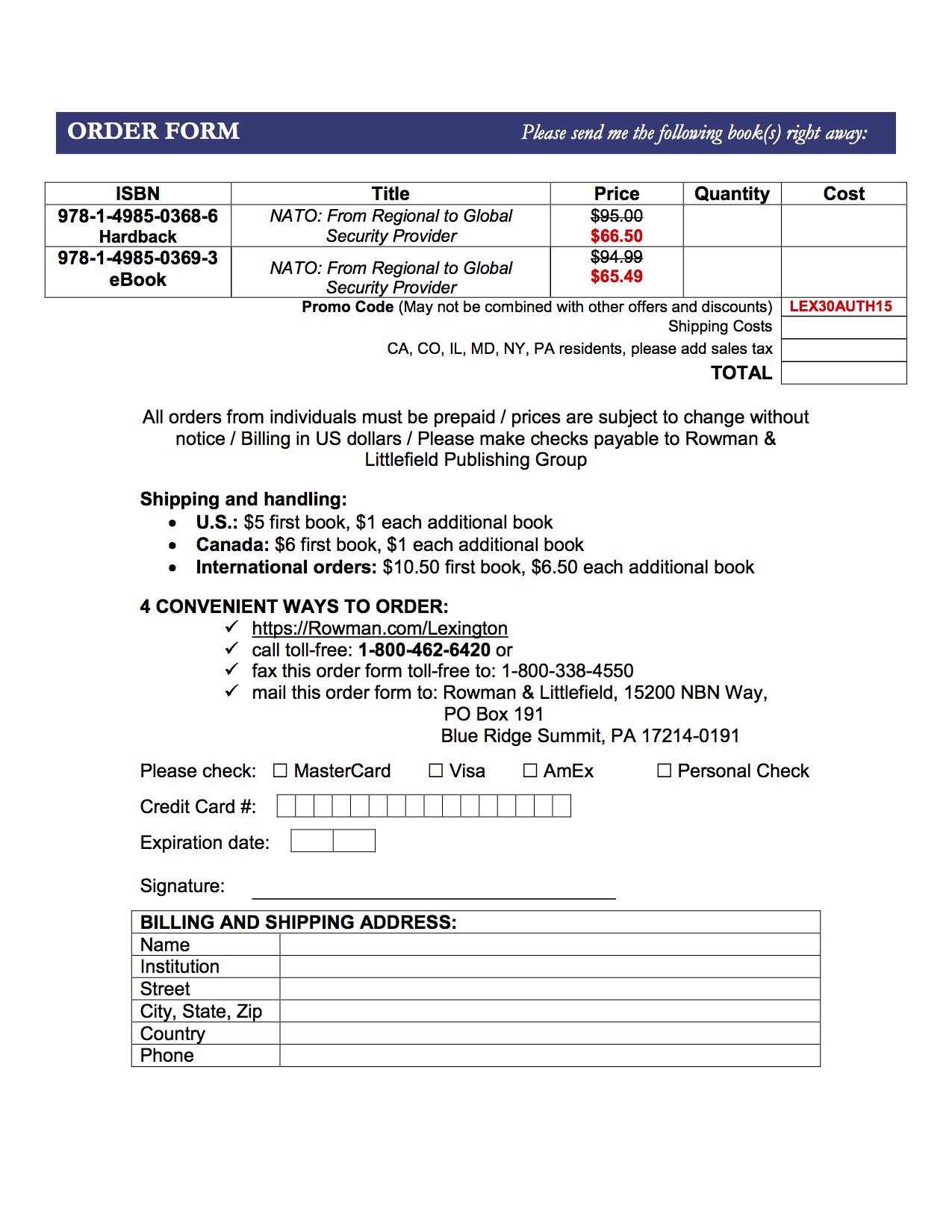Potomac Institute for Policy Studies Senior Fellow Amb. David Smith, (Ret.), directs the Georgian Security Analysis Center in Tbilisi, Georgia. In an article for the Georgian publication Tabula, he looks at the recent revolts in the Middle East and North Africa. Amb. Smith writes that although the full ramifications of these events remain unclear, worldwide socio-economic impacts - including rising insecurity about energy supplies - could have the effect of empowering Russia. Click below to read the article in full.
International Center for Terrorism Studies (ICTS)
ICTS Reports
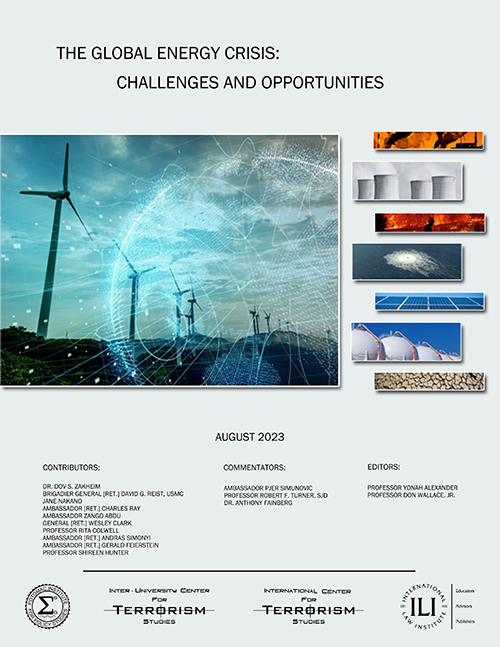 PROFESSOR YONAH ALEXANDER AND PROFESSOR DON WALLACE, JR. EDITORS
PROFESSOR YONAH ALEXANDER AND PROFESSOR DON WALLACE, JR. EDITORS
A popular English proverb provides an insightful lesson of history, “He that would know what shall be, must consider what hath been. Things present are judged by things past.” Indeed, a realistic assessment of permanent factors of domestic and international life entails consideration of factors such as the struggle of power within and among nations.
It is not surprising, therefore, that throughout recorded history national, regional, and global energy security interests and concerns required a critical focus that is expanding with every passing year. Thus, interdisciplinary published and unpublished literature reveals infinite lists of relevant terms, concepts, trends, consequences, costs, and impacts on societies past, modern, and even, to the minds of some, predictable glimpses of thousands of years hence.
This extensive lexicon brings to mind topics such as artificial intelligence, business, coal, crime, cyber, diplomacy, disasters, economy, environment, gas, leadership, media, military, nuclear, peace, propaganda, science, solar, strategy, terrorism, and war.
By June 2023, these energy-related topics have grown substantially both at home and abroad. For example, in North America frequent storms in the state of Texas, have caused the Electric Reliability Council of Texas to ask residents to cut power consumption and turn up their thermostats amid rising temperatures. This has been a growing concern in Texas, as its power grid is largely cut off from the rest of the U.S.i
Colombia’s Ecopetrol is sustaining sales to Asia at about 45% of its crude oil production even with the competition from Russian oil forcing it to offer deeper discounts.ii
In Africa, cheap contraband petrol from Nigeria abruptly doubled in price. This caused black market fuel vendors’ and commercial drivers’ businesses to collapse in Cameroon, Benin, and Togo.iii
In Europe, Germany’s energy prices have surged. Some companies are considering leaving the country altogether. Russia’s invasion of Ukraine continues to affect the rising increase of energy prices across Europe.iv
China’s fulfillment of its green energy targets for 2030 looks to be five years ahead of schedule, but coal plants are increasingly being produced as a backup for new wind and solar farms. China’s increasing capacity to generate power from wind and solar could have a significant affect on limiting impacts of rising temperatures.v
Saudi Arabia’s Aramco and France’s TotalEnergies have been awarded Engineering, Procurement and Construction contracts for the $11 billion Amiral complex in Saudi Arabia. The award of the EPC contracts marks the start of construction work on the joint petrochemical expansion.vi
Australia’s government made a $66.35 million investment into the Waratah Super battery. The project is aimed at helping ease demands on the grid as the Eraring coal power plant is set to be decommissioned in 2025.vii
The Organization of the Petroleum Exporting Countries (OPEC) announced that global oil demand will rise to 110 million barrels a day in about 20 years, increasing the world’s oil demand by 23%.viii
An International Atomic Energy Agency (IAEA) mission stated that Croatia remains committed to addressing the challenges of managing its radioactive waste shortly after the Integrated Review Service for Radioactive Waste and Spent Fuel Management Decommissioning and Remediation (ARTEMIS) review team concluded a nine-day mission to Croatia.ix
With the upcoming UN climate talks in November 2023, representatives have argued for a plan to fight climate change by welcoming oil and gas companies to participate more fully in the talks, with energy use derived from fossil fuels accounting for more than two-thirds of global emissions.x
These random media reports and many thousands of previous instances have been continuously considered by contemporary scholars, professionals, and policy-makers.
As we have repeatedly learned from history, the two key causes of catastrophic disasters are “Mother Nature” and “man-made.” These twin permanent threats to humanity have brought grave security costs on political, social, economic, and strategic levels. Therefore, it is not surprising that every generation from antiquity to modern times has developed “best practices” to cope with selected current challenges as well as a need to avert or survive the next expected and unexpected national, regional, and global dangers.
More specifically, such tragedies include earthquakes, famine, and plagues. Thus, during early 2023, misfortunes have struck China, Turkey, and Sudan. Additionally, the death toll due to the raging Covid-19 pandemic has reached 6,922,654i as of May 1, 2023.
Similarly, technological failures such as leakages of nuclear power plants occurred in the United States, Japan, and Ukraine. Also, state and non-state actors have launched tragic terrorist operations, wars, and flights of refugees, at home and abroad. Will civilization survive ongoing and future human conventional and unconventional calamities?
Like any other world region, Latin America has faced two security challenges. The first stems from natural disasters, such as earthquakes and infectious diseases. The second consists of “man-made” threats including organized crime, terrorism, insurgency, and war triggered by internal and external adversaries.
Indeed, many factors have contributed to these dual security calamities. Aside from afflictions by Mother Nature, mention should be made of vulnerabilities created by porous borders; established smuggling routes; implementation at various times of Marxism, Leninism, Maoism, Castroism, fascism, and right-wing ideological models promoting dictatorships and military regimes; violating individual and collective human rights; weakening governmental institutions and the rule of law; sustaining corruption practices; and mismanaging scarce economic resources.
Some of the notable security-related concerns in Latin America several years prior to the Covid-19 pandemic include a landslide in Colombia that killed over 300 people; protests surrounding Venezuela’s Supreme Court ruling on the National Assembly’s power; Brazil’s Alcaçuz prison riot; an earthquake in Ecuador that killed over 650 people; and the assassination of a Mexico City mayor.
The security challenges in early 2023 are: Nicaragua’s canceled citizenship for 94 political opponents; an outbreak of dengue in Bolivia which killed 26 people; Ecuador being ranked as the least safe country in Latin America due to escalated gang violence, drug trafficking, and civil unrest; and in Peru, 48 citizens being killed as well as over 1,300 others injured while protesting the removal of President Pedro Castillo.
PROFESSOR YONAH ALEXANDER AND PROFESSOR DON WALLACE, JR. EDITORS
One cannot fully understand the impact of rising terrorism in North Africa and the Sahel without looking back to numerous warning signs that exploded during the post-WWII period. Thus, one tragic historical lesson relates to the December 21, 1988, mid-air explosion of Pan Am Flight 103 over Lockerbie, Scotland, perpetrated by a Libyan state-sponsored operation. It resulted in the death of 270 passengers, mostly Americans. Although Muammar Gaddafi’s 42 years of dictatorship were replaced by a new Tripoli regime in 2011, Libyan terrorism is alive and well. This brutal reality was graphically illustrated by the killing of four U.S. government personnel, including Ambassador John Christopher Stevens, in Benghazi on September 11, 2012. In fact, several days after this attack, a Libyan preacher during a Friday sermon called on the faithful to “detonate our wrath upon them” and “stab them in their main artery.”1
Therefore, it is not surprising that the Inter-University Center for Terrorism Studies (IUCTS), in cooperation with its academic partners such as the George Washington University, the Potomac Institute for Policy Studies, the International Law Institute, and other institutions in the U.S., Africa, Asia, and elsewhere have developed interdisciplinary educational programs focusing on security challenges in the Maghreb—Algeria, Libya, Mauritania, Morocco, and Tunisia—as well as adjacent areas such as Chad, Mali, Niger, Nigeria, and their regional and global strategic implications.
More specifically, our latest academic work has included a number of publications. The first on, “Why the Maghreb Matters: Threats, Opportunities & Options for Effective U.S. Engagement in North Africa” was published by the Potomac Institute for Policy Studies and the Conflict Management Program at the John Hopkins University School of Advanced International Studies on March 31, 2009. This initial work was guided by a bipartisan panel, including former Secretary of State Madeleine Albright, General (Ret.) Wesley Clark, Ambassador (Ret.) Stuart Eizenstat, Professor William Zartman, and other distinguished former officials and academics. The panel recommended more effective engagement in the region to prevent a brewing security crisis from erupting there.
Another following report is, “Terrorism in North Africa and the Sahel in 2015” that was authored by Yonah Alexander and published in March 2016. This work drew similar conclusions, thereby underscoring the pessimistic reality that the region is engaged in a generational socio-cultural conflict that impacts the global community. Indeed, events continue to point to a growing “arc of instability” across the region, with consequences beyond any country’s borders.
Additionally, in 2017, another study also authored by Yonah Alexander observed that focusing international attention on the region can help enable the seeds of conflict resolution, political accommodation, economic and social development, and national reconciliation to emerge and counter the forces of instability and chaos. The publication therefore recommended that, to be sustainable and effective, these solutions require an integration of global and local resolve as well as resources. Without an effective menu of responses to the challenges of terrorism and instability, these threats to the world community will only continue to grow.
The current March 2023 publication draws from the recent Zoom Forum titled, “The Security Situation in the Sahel: Assessing Threats and Responses” that was held virtually on November 2, 2022. It included the following distinguished invited speakers Professor Jibrin Ibrahim (Senior Fellow, Centre for Democracy & Development); Ambassador Zango Abdu (Country Manager, USIP Nigeria; Director, Sahel Institute for Strategic Studies); Professor Yasmine Hasnaoui (University Professor of Humanities & Political Science at the American International University, Kuwait); Ambassador (Ret.) Charles Ray (Former United States Ambassador to Cambodia and Zimbabwe); Professor Rita Colwell (Distinguished University Professor at Maryland and Johns Hopkins); and Dr. Chris Kwaja (Associate Professor of International Affairs at the Center for Peace and Security, Modibbo Adama University, Yola, Adamawa State, Nigeria). Deep appreciation is due to their exceptional contributions to the Forum.
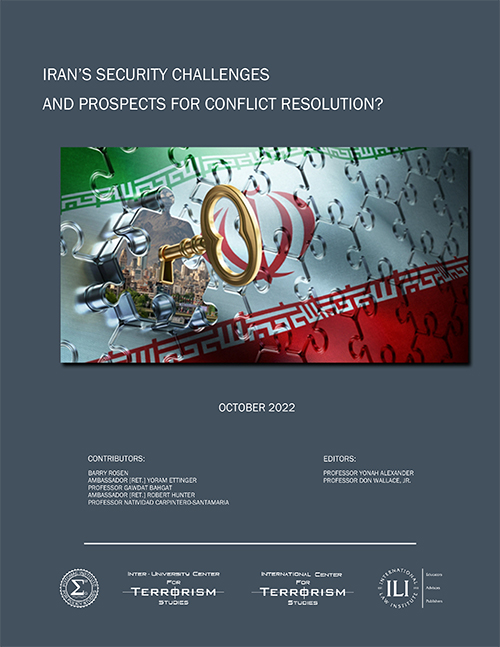 The rise of power in Iran of the Ayatollah Ruhollah Khomeini and the November 1979 seizure of the United States Embassy in Tehran and of some 60 American hostages by “revolutionary students” triggered a flurry of introspection in Washington concerning the policies which successive Administrations had followed with a country of enormous strategic and economic importance in the Middle East.
The rise of power in Iran of the Ayatollah Ruhollah Khomeini and the November 1979 seizure of the United States Embassy in Tehran and of some 60 American hostages by “revolutionary students” triggered a flurry of introspection in Washington concerning the policies which successive Administrations had followed with a country of enormous strategic and economic importance in the Middle East.
Among the questions that have been raised during that historical period were the following: What had gone wrong? Why had the United States failed to correctly assess the strength of the elements that brought down the Shah Shahanshah, King of Kings, Mohammed Reza Pahlavi in January 1979, after a 37-year rule? Why had the United States linked its fortunes so closely to those of the Shah in the first place? What did the national interests of the United States consist of as applied to Iran? What were the full implications of the transformation of Iran from a friendly ally to a hostile adversary of the United States?
These and related issues were analyzed in a study on The United States and Iran: A Documentary History, co- edited by Yonah Alexander and Allan Nanes and published by the University Publications of America in 1980. This work was prepared in association with the World Power Studies Program of the Center for Strategic and International Studies at Georgetown University.
During the next 43 years, extensive research efforts have been undertaken by the Inter-University Center for Terrorism Studies (IUCTS) and its academic partners such as the Potomac Institute for Policy Studies (PIPS) and the International Law Institute (ILI), focusing on Iran’s strategic and tactical intentions, capabilities, and actions. For instance, Tehran’s expanding terrorism role was discussed within the framework of the study, Terrorism: As State-Sponsored of Covert Warfare, co-authored by Ray S. Cline and Yonah Alexander and published by Hero Books in 1986.
This work was prepared in cooperation with the Center of Strategic and International Studies at the request of the Subcommittee on Security and Terrorism for the use of the Committee on the Judiciary of the United States Senate. The publication underscored the fact that the goal of psychological terror and physical violence employed by totalitarian dictatorships, like the Iranian regime, is to maintain control of their own people and to expand this kind of control over other regions and nations. In the face of Iran’s terrorism challenge, the United States, its friends and allies, particularly Israel, have developed a wide range of countermeasures. They consisted inter alia of intelligence, economic and security assistance, political and diplomatic pressures, economic sanctions, clandestine counter-terrorism infiltrations, covert and overt military operations.
Despite these activities, Tehran continued to resort to terrorism at home and abroad. Additionally, Iran’s apparent vision of a country becoming the dominant power in the Middle East had led its leadership to develop a nuclear program in open defiance of United Nations resolutions. In this connection, the IUCTS once again had conducted a major research project resulting in the release of a study on The New Iranian Leadership: Ahmadinejad, Nuclear Ambition, and the Middle East. This book, co-authored by Yonah Alexander and Milton Hoenig, was published by Praeger Security International in 2007. It documented Ahmadinejad’s background and rise to power and explained the structure of the Iranian Revolutionary government—the competing centers of power and the major players. The study then detailed the terrorist groups funded and armed by Iran, primarily Hizballah and Hamas. It also provided a comprehensive picture of Iran’s apparent aspirations to acquire nuclear weapons, as well as the related implications for regional and global security concerns.
Moreover, numerous seminars and conferences related to the multiple Iranian security challenges to the international community were held in the United States and abroad. For example, on December 6, 2011, a Forum was organized by the IUCTS on “Iran’s Nuclear Program: A Final Warning?” The event highlighted Tehran’s nuclear weapon program amidst the backdrop of an uncertain political reality in the Middle East.
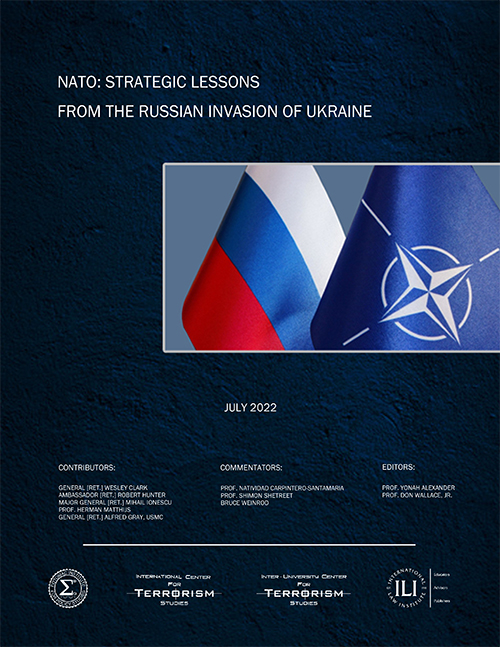 Recorded history has repeatedly provided tactical and strategic lessons on the nature of political relations within, between, and among nations. Numerous universal postulates for the conduct of statecraft have been offered by philosophers, politicians, scholars, and other observers reflecting on the experiences of diverse societies regarding what does and does not work.
Recorded history has repeatedly provided tactical and strategic lessons on the nature of political relations within, between, and among nations. Numerous universal postulates for the conduct of statecraft have been offered by philosophers, politicians, scholars, and other observers reflecting on the experiences of diverse societies regarding what does and does not work.
These collective insights focus on the perceived realities of national, regional, and global matters, including the role of history, the supremacy of self-interest, the cost of wars, and the benefits of peace. Other views deal with the nature of diplomacy in the struggle for power, and the value of multinational alliances in securing a stable world order based on the rule of law, the protection of human rights, and the advancement of economic progress and prosperity.
As NATO, the North Atlantic Treaty Organization, celebrates more than 70 years of existence, it remains the most significant defensive alliance in the past two centuries. In early 2022, its 30 nation-state members are still facing a broad range of old and new horizontal and vertical challenges. These include piracy, terrorism, regional conflicts, humanitarian crises, proliferation of weapons of mass destruction (WMDs), and cyber threats.
Moreover, NATO’s three core tasks, namely, deterrence and defense; crisis prevention management; and cooperative security are being critically tested during the Russian Federation war of aggression launched against Ukraine, a non-member independent country in the Euro-Atlantic region.
It is against this background that NATO has acknowledged Russia as its greatest direct security threat. The alliance announced its intention to defend “every inch” of its members’ territory. Additionally, Finland and Sweden have officially been invited to join the alliance. Other significant strategic measures have been adopted at the Madrid Summit Declaration on June 29, 2022.
The current report “NATO Strategic Lessons From the Russian Invasion of Ukraine” (July 2022) held as a Zoom Forum on April 28, 2022 focuses on the above developments and looking forward. This virtual Forum began with opening remarks by Professor Don Wallace Jr. (Chairman, International Law Institute) and was moderated by Professor Yonah Alexander (Director of the International Center for Terrorism Studies and Senior Fellow at the Potomac Institute for Policy Studies). The following distinguished panel of scholars and practitioners gave presentations and subsequent discussion; General (Ret.) Wesley Clark (Former Supreme Allied Commander Europe); Ambassador (Ret.) Robert Hunter (Former U.S. Ambassador to NATO); Major General (Ret.) Dr. Mihail E. Ionescu (Professor, National School of Political and Administrative Studies (SNSPA) Bucharest, Romania); Professor Herman Matthijs (University Ghent & Free University Brussels); Professor Natividad Carpintero- Santamaria (Professor at the Polytechnic University of Madrid (UPM) and General Secretary of the Instituto de Fusión Nuclear “Guillermo Velarde”); Professor Shimon Shetreet (Greenblatt Chair of Public and International Law, Hebrew University of Jerusalem; Former Cabinet Minister and MK, Israel); and Bruce Weinrod (Former Secretary of Defense Representative for Europe and former Deputy Assistant Secretary for European and NATO Policy. Closing remarks were delivered by General (Ret.) Alfred Gray, USMC (29th Commandant of the U.S. Marine Corps (1987-1991); Chairman of the Board of Directors and Regents, Potomac Institute for Policy Studies).
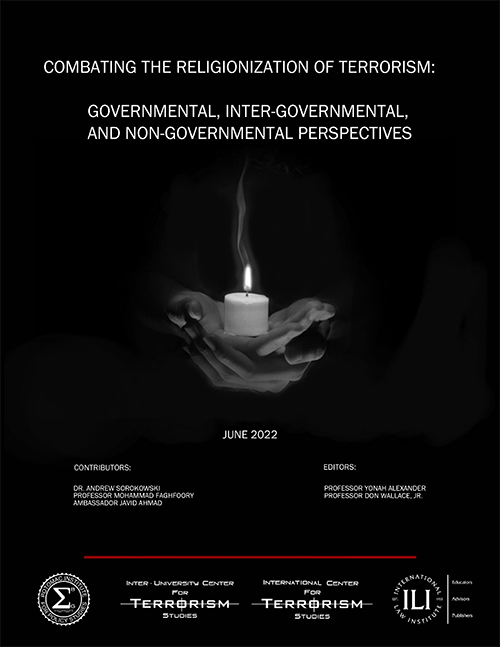 The history of mankind from time immemorial to the modern era consists of overwhelming evidence that multiple dogmas of religious denominations have contained various manifestations of hatred and violence towards other perceived antagonistic believers. For instance, in the 1990s religious self-righteousness and within and among nations around the globe.
The history of mankind from time immemorial to the modern era consists of overwhelming evidence that multiple dogmas of religious denominations have contained various manifestations of hatred and violence towards other perceived antagonistic believers. For instance, in the 1990s religious self-righteousness and within and among nations around the globe.
Suffice to mention, the exploitation of religious symbols and concepts to advance radical political agendas in places such as Northern Ireland, Nigeria, and India.
Furthermore, the informal and formal network among different sub-state and state-sponsors has created a structure to promote terrorism on national, regional, and global levels. This modern political framework has consisted of many forms: theological alliances; organizational assistance; propaganda and psychological warfare; financial help; recruitment support; intelligence systems; supply of weapons; training; coordinated operational missions; and sanctuary availability.
To be sure, other various disciplinary factors have also directly and indirectly contributed to seemingly endless cases of brutality and bloodshed. These elements include, inter alia, ethnic, racial, and tribal intolerance and violence; extreme nationalism and separatism; regional and inter-regional conflicts that defy easy solutions; intensification of criminal activity; population explosion, migration expansion, and rising poverty; the widening economic gap between North and South; environmental challenges; expanding health security concerns; and proliferation of modern weapon technologies.
And yet, as we have entered the 21st century, a promising contemporary trend of inter-faith relations has envisioned a renewed ecumenical trend, reflecting the minimization of religious confrontations and maximizing cross-theological cooperative efforts. For instance, a Millennium World Peace Summit held in New York formed an organizational structure of religious leaders to advise the United Nations on preventing and settling political disputes stemming from traditional religious animosities.
Alas, this and other similar hopeful efforts have been derailed by the tragedy of 9/11 and the continued rise of theological-inspired state and non-state terrorism, insurgencies, and wars during the past two decades.
In view of the current Russian invasion of Ukraine, a key question is whether any potential inter-faith initiatives can contribute, however modestly, in the search for peace with justice regionally and globally?
At this stage of deepening security uncertainties, two encouraging flickering lights in the “fog of war” should be noted for future analytical considerations. The first is a May 2022 gathering of world religious leaders in Saudi Arabia that uniquely demonstrated a major inter-faith effort.
The Muslim World League organized the first-ever “Forum on Common Values among Religious Followers” in Riyadh. Invited delegates from Muslim, Christian, Jewish, and other religious denominations participated in establishing and outlining fundamental agreements in advancing the cause of peace.
A communique issued by the Saudi organizers stated that, “the Forum’s collective objectives were to reach a universal consensus between global spiritual leaders, leverage their commonalities by placing them at the forefront of human values, effectively support efforts to advance tolerance and peace, and set rational intellectual-frameworks to immunize against the dangers of extremist ideology and behavior regardless of its source.”
The communique also included areas of agreements for religious policy that were reached at the gathering, including the fundamental role of religion in society, the spiritual basis for basic human rights, and a rejection of an “inevitable civilizational clash” among religions. Notably, the Archbishop of the Orthodox Church of Ukraine Ivan Zoria also attended this event.
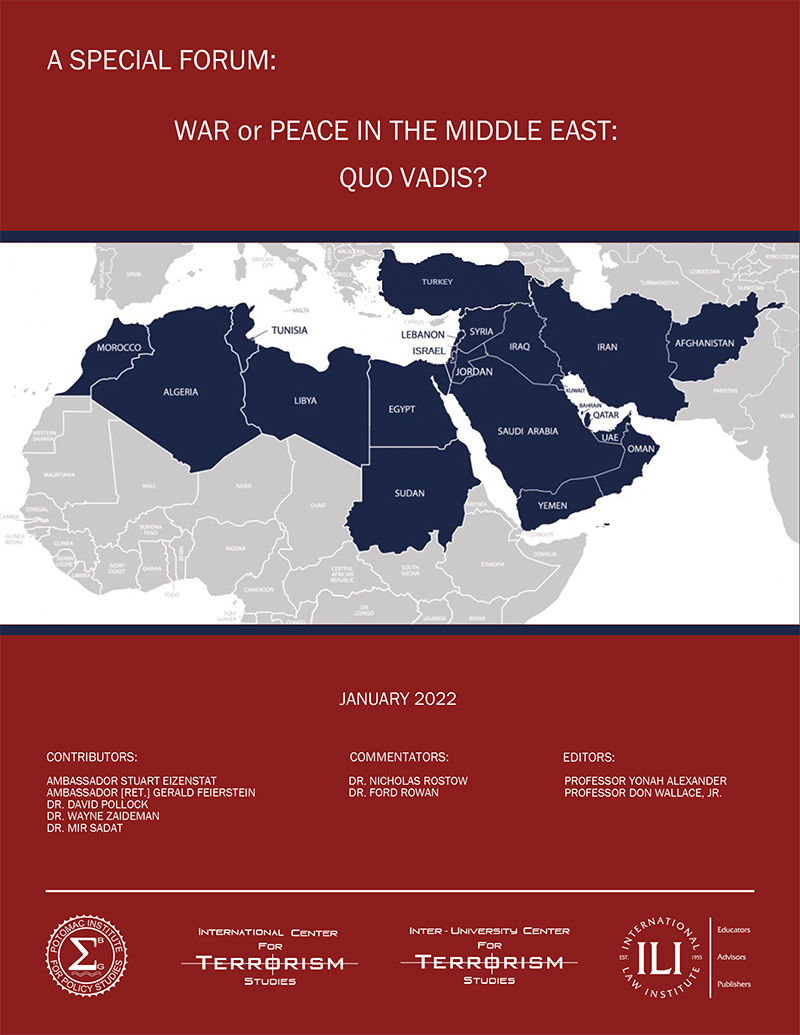 As we are entering 2022, the world once again has been facing an alarming upsurge of threats to peace in the form of terrorism, insurgencies, and outbreaks of full-scale wars. Some of the expanding manifestations of violence have been aggravated by ideological extremism, nationalistic fanaticism, ethnic hatred, racial prejudices, religious animosities and justified in the name of “rights,” “justice” and even “peace.”
As we are entering 2022, the world once again has been facing an alarming upsurge of threats to peace in the form of terrorism, insurgencies, and outbreaks of full-scale wars. Some of the expanding manifestations of violence have been aggravated by ideological extremism, nationalistic fanaticism, ethnic hatred, racial prejudices, religious animosities and justified in the name of “rights,” “justice” and even “peace.”
The current security challenges amid the relenting Covid-19 pandemic include the renewed Palestinian-Israeli hostilities in Gaza, the raging conflicts throughout the region in Syria, Iraq, Yemen, Libya, as well as Iran’s continuing terrorism threats and nuclear ambitions.
The stopping of the unfolding violence and building a lasting peace is critical. Thus, the academic community has an obligation to participate in the international effort to advance the cause of peace in the Middle East and elsewhere.
In this connection it is important to note several relevant studies that were undertaken over the years. First is a book titled Crescent and Star: Arab and Israeli Perspectives on the Middle East Conflict edited by Yonah Alexander and Nicholas N. Kittrie and published by AMS Press in New York and Toronto in 1973. This volume focused on various questions that underlie the regional and global challenges. Some of the issues addressed were the following: a conflict between two antagonistic nationalisms; religious and ethnical tensions; violations of minority and human rights; expansionism and boundary disputes; conflict over the control of Jerusalem and the Holy Places; hostilities concerning the use of the Jordan River and freedom of navigation in the Gulf of Aqaba and Suez Canal; a competition among world powers.
The second academic effort was a study on The Role of Communications in the Middle East Conflict: Ideological and Religious Aspects by Yonah Alexander that was released by Praeger Publishers (New York, Washington, London) in 1973. This volume was conducted as part of a larger project on the role of mass communication in the advancement of international understanding sponsored by the Graduate School of Journalism at Columbia University. The main questions which were analyzed included the following:
First, is the confrontation between Arab nationalism and Zionism inevitable and therefore insurmountable? Or does it indicate a certain historical stage between Arabs and Israeli Jews and is likely to disappear?
Second, are the antagonists and their partisans using religion-based communications to fan the flames of conflict and thereby advance the cause of war? To what extent do they dampen the passion of strife and consequently promote the cause of peace?
Third, can religion serve as a more effective tool for peace communications and help to ease the frictions and lessen the tension in the Middle East and beyond?
Another relevant work is Palestinian Religious Terrorism: Hamas and Islamic Jihad authored by Yonah Alexander and released by Transnational Publishers in Ardsley, New York in 2002. This particular book exposes much of the mystique of these organizations and places them as two of the many other challenges facing not only Israel but also the entire international community in its war against terrorism, whether it is waged in the Middle East or elsewhere.
In addition to the forgoing studies, the Inter-University Center for Terrorism Studies (IUCTS), organized numerous other academic research activities. Suffice to mention the publication of multiple selected books since 9/11 including: Usama bin Laden’s al-Qaida: Profile of a Terrorist Network (Brill Nijhoff, 2001) by Yonah Alexander and Michael S. Swetnam; The New Iranian Leadership: Ahmadinejad, Terrorism, Nuclear Ambition, and the Middle East (Praeger, 2007) by Yonah Alexander and Milton Hoenig; Al-Qa'ida: Ten Years After 9/11 and Beyond (Potomac Institute Press, 2012) by Yonah Alexander and Michael S. Swetnam; The Islamic State: Combating the Caliphate Without Borders (Lexington Books, 2015) by Yonah Alexander and Dean Alexander.
Among the other numerous reports released by the IUCTS include: “Arab Spring: A Year Later and Beyond” (March 2012); “Combating Hizballah’s Global Network” (October 2013); “Tehran’s Bomb Challenge: Crossroads, Roadblocks, and Roadmaps to Rapprochement?” (March 2014); “Israeli- Palestinian Peace Process: Endless or Endgame?” (July 2014); “Combating the Islamic State: Is a New Strategic Blueprint Needed?” (January 2016); “Russia’s Strategic Puzzle: Past Lessons, Current Assessment, and Future Outlook” (March 2016); “Syria: Quo Vadis?” (October 2015); “The Holy Jerusalem: A Key to Middle East War or Peace?” (December 2016); “Terrorism in North Africa and the Sahel in 2016” (March 2017); “Preventing WMD Terrorism: Ten Perspectives” (August 2017); “The Role of Diplomacy in Combating Terrorism: Selected Perspectives” (March 2018); “Biological Terrorism: International Dimensions” (June 2019).
As the Covid-19 pandemic emerged in early 2020, our colleagues at the International Law Institute (ILI) and the Potomac Institute for Policy Studies (PIPS) organized a Special Ambassadors’ Forum on the “Middle East Security Challenges: Past Lessons and Future Outlook” held on February 6, 2020 at the International Law Institute in Washington, DC.
This event featured Ambassador Stuart Eizenstat, a four decades-long policy maker, diplomat, scholar, attorney, and author who discussed his highly acclaimed book President Carter: The White House Years (St. Martin’s Press, 2018). The video of the entire program is accessible here:
.It is our honor to incorporate Ambassador Eizenstat’s contribution in the current report, “War or Peace in the Middle East: Quo Vadis?” We are including a selection of Ambassador Eizenstat’s remarks related to the Middle East prior to incorporating our colleagues’ presentations from the July 22, 2021 event.
The program of this event began with opening remarks by Professor Don Wallace (Chairman, International Law Institute). The virtual Forum was moderated by Professor Yonah Alexander (Director of the International Center for Terrorism Studies and Senior Fellow at the Potomac Institute for Policy Studies). Presentations and discussion were offered by Ambassador (Ret.) Gerald Feierstein (Senior Vice President, Middle East Institute); Dr. David Pollock (Bernstein Fellow, The Washington Institute); Dr. Wayne Zaideman (Retired Special Agent and Legal Attaché at the FBI, Middle East); Dr. Mir Sadat (Former Policy Director, U.S. National Security Council); Dr. Nicholas Rostow (Senior Research Scholar, Yale Law School); Dr. Ford Rowan (Chairman of the National Center for Critical Incident Analysis).
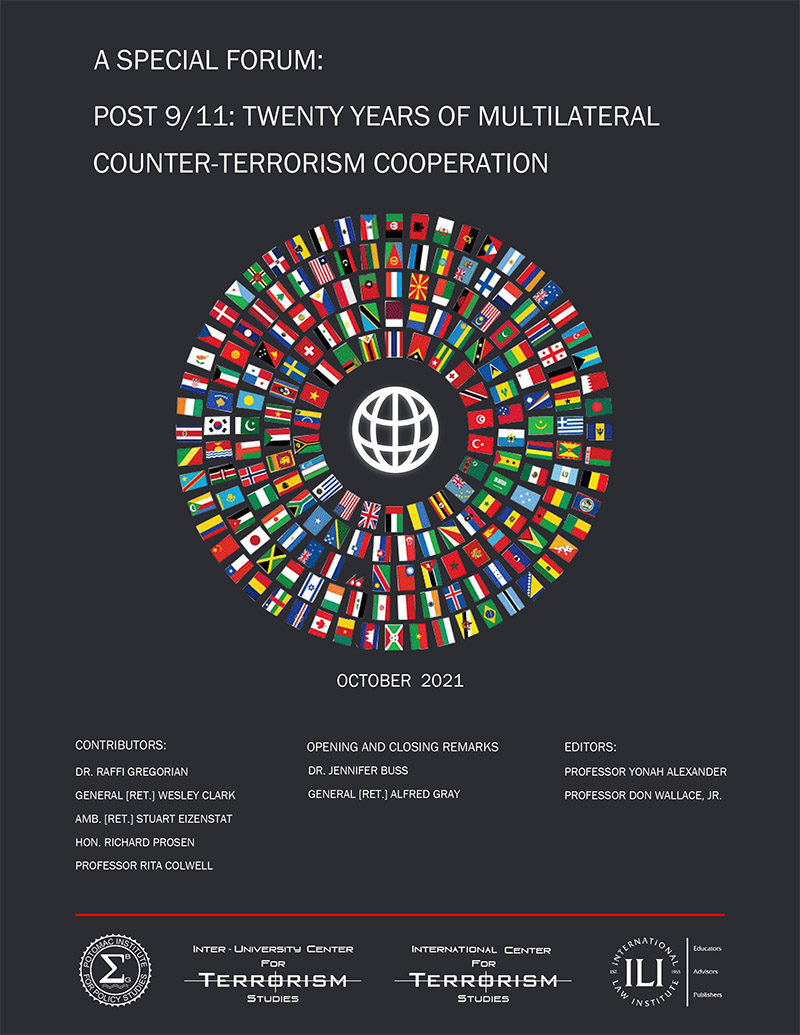 The resort of force and violence by state and non-state actors in the struggle for power within and among nations is as old as history itself. Both the strong and the weak have deployed modus operandi capabilities ranging from primitive to modern technologies with profound consequences to the security concerns to the global system.
The resort of force and violence by state and non-state actors in the struggle for power within and among nations is as old as history itself. Both the strong and the weak have deployed modus operandi capabilities ranging from primitive to modern technologies with profound consequences to the security concerns to the global system.
It is not surprising therefore that two decades after 9/11, terrorism from above and below still continues to cast a worrisome arc of instability and political conflicts over many countries and regions of the world. The debate in democracies over the need to craft effective responses to domestic and international terrorism focuses inter alia on realpolitik coupled with moral and human rights considerations.
For instance, since 9/11 expanded state power in the Unites States, these have included policies such as “Global War on Terror”, “Overseas Contingency Operations”, and other strategic and tactical approaches authorizing the use of military force internally and externally. Additionally, the European Union developed key roadmaps and toolkits for combating terrorism and securing the national interests of member-states (e.g., prevent, pursue, prosecute, punish, persuade, and protect).
Most recently, the United Nations that began its annual General Assembly session in September 2021, has placed discussion items on its agenda regarding combating and eliminating terrorism as well as maintaining international peace and security.
Mindful of the past and current security concerns, effective multilateral counter-terrorism cooperation requires increased international alliances of like-minded nations through diplomacy and other measures in responding successfully to potential conventional and non-conventional terrorist threats in the remainder of the 21st Century.
In this context, the Inter-University Center for Terrorism Studies (IUCTS), the Potomac Institute for Policy Studies (PIPS), the International Law Institute (ILI), and other academic partners organized the virtual academic Forum on “Post 9/11: Twenty Years of Multilateral Counter-Terrorism Cooperation” held on September 09, 2021.1 The program of this event began with opening remarks by Professor Don Wallace, Jr. (Chairman of the International Law Institute) and Dr. Jennifer Buss (CEO, Potomac Institute for Policy Studies). The virtual Forum was moderated by Professor Yonah Alexander (Director of the International Center for Terrorism Studies). Presentations and discussion were by Dr. Raffi Gregorian (Deputy to the Under- Secretary-General & Director, United Nations Office of Counter-Terrorism), Gen. (Ret.) Wesley Clark (Former NATO Supreme Allied Commander), Amb. (Ret.) Stuart Eizenstat (Former Senior Official with Three US Administrations and Ambassador to the European Union), Hon. Richard Prosen (Deputy Director, Office of Multilateral Affairs, Bureau of Counterterrorism, U.S. Department of State), and Distinguished University Professor Rita Colwell (University of Maryland, College Park; Johns Hopkins University, Bloomberg School of Public Health). Closing remarks were delivered by Gen. (Ret.) Alfred Gray (29th Commandant of the U.S. Marine Corps (1987-1991) and Chairman of the Board of Directors and Regents, Potomac Institute for Policy Studies). This event is the latest Forum on inter-disciplinary health and security threats mounted within the academic framework of 2021 programs.
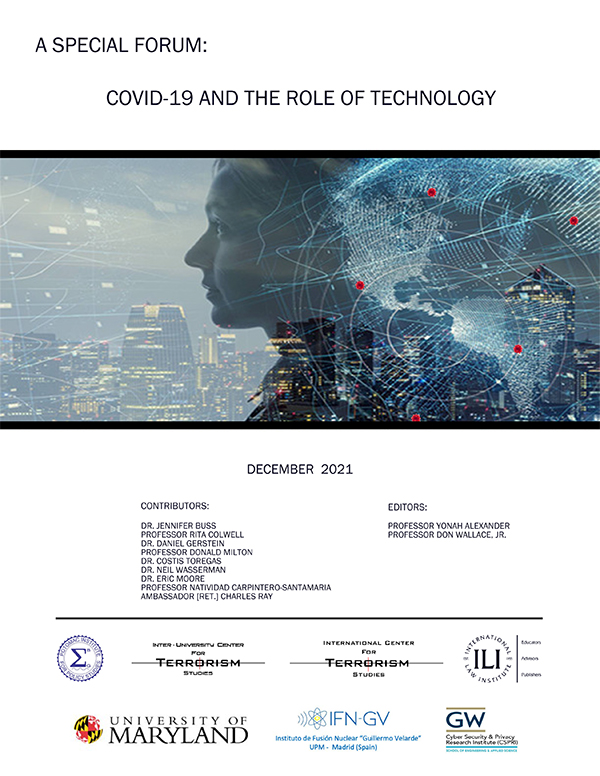 The national, regional, and global spectrum of biological challenges is limitless. Throughout recorded history, these challenges have come essentially from two inevitable sources of enduring actual and potential dangers to individuals, communities, societies, and civilizations.
The national, regional, and global spectrum of biological challenges is limitless. Throughout recorded history, these challenges have come essentially from two inevitable sources of enduring actual and potential dangers to individuals, communities, societies, and civilizations.
The first critical threat is caused by Mother Nature’s disasters, such as earthquakes, cyclones, and infectious diseases. The second concern is man-made menaces, including violent radicalism, terrorism, and war. The key question is whether the United States and the international community are prepared to identify, prevent, and counter current and future biological threats. In this era of expanding multi security challenges at home and abroad, it is critical to understand the role of technology as a major driver in world evolutionary events.
In this context, the current report focuses specifically on “COVID-19 and the Role of Technology” (December 2021) and its experienced lessons anticipating future health and security related challenges nationally and globally. This timely Forum reviews selected successful and new technologies, such as bio-detection, respiratory epidemiology, vaccinations, artificial intelligence, cyber defense, as well as other relevant topics. Contributions and insights were provided by an invited interdisciplinary panel of academics and practitioners who participated at a special virtual Forum held on June 29, 2021 and administered at the Potomac Institute for Policy Studies.
The program of this event began with opening remarks by Dr. Jennifer Buss (CEO, Potomac Institute for Policy Studies). The virtual Forum was moderated by Professor Yonah Alexander (Director of the International Center for Terrorism Studies and Senior Fellow at the Potomac Institute for Policy Studies). Presentations and discussion were offered by Distinguished Professor Rita Colwell (University of Maryland, College Park; Johns Hopkins University, Bloomberg School of Public Health); Dr. Daniel Gerstein (Former Acting Undersecretary and Deputy Undersecretary for the Department of Homeland Security); Dr. Donald Milton (Professor of Environmental Health at the University of Maryland School of Public Health, with a secondary appointment in the Department of Medicine, School of Medicine); Dr. Costis Toregas (Director, Cyber Security and Privacy Research Institute at The George Washington University); Dr. Neil Wasserman (Department of Computer Science The George Washington University); Dr. Eric L. Moore (Director, U.S. Army Combat Capabilities Development Command Chemical Biological Center (DEVCOM CBC)); Dr. Natividad Carpintero-Santamaria (Professor at the Polytechnic University of Madrid (UPM) and General Secretary of the Instito de Fusion Nuclear “Guillermo Velarde”); and Amb. (Ret.) Charles Ray (Former US Ambassador to Cambodia and Zimbabwe). Closing remarks were delivered by Professor Yonah Alexander.
The preface of this report includes an overview of Mother-Nature’s and man-made threats as well as an academic context for our study.
 The national, regional, and global spectrum of biological challenges is limitless. Throughout recorded history, these safety concerns stem essentially from two inevitable sources of enduring actual and potential dangers to individuals, communities, societies, and civilizations.
The national, regional, and global spectrum of biological challenges is limitless. Throughout recorded history, these safety concerns stem essentially from two inevitable sources of enduring actual and potential dangers to individuals, communities, societies, and civilizations.
The first critical threat is caused by Mother Nature’s disasters, such as earthquakes, cyclones, and infectious diseases. The second concern is man-made menaces, including violent radicalism, terrorism, and war. The key question is whether the United States and the international community are prepared to identify, prevent, and counter current and future biological threats.
In this context, the current report on “Covid-19 and the Role of the Military” [November 2021] consists of contributions by invited interdisciplinary academics and practitioners who participated at a special virtual Forum held August 23, 2021 at the Potomac Institute for Policy Studies. The program of this event began with opening remarks by Dr. Jennifer Buss [CEO, Potomac Institute for Policy Studies]. The virtual Forum was moderated by Professor Yonah Alexander [Director of the International Center for Terrorism Studies]. Presentations and discussion were by Lieutenant General [Ret.] Vincent Stewart [20th Director of the Defense Intelligence Agency [DIA]]; Distinguished University Professor Rita Colwell [University of Maryland, College Park; Johns Hopkins University, Bloomberg School of Public Health]; Major General [Ret.] Dr. Mihail E.Ionescu [Professor, National School of Political and Administrative Studies [SNSPA],Bucharest, Romania]; and Ambassador [Ret.] Charles Ray [Former U.S. Ambassador to Cambodia and Zimbabwe]. Closing remarks were delivered by Gen. [Ret.] Alfred Gray [29th Commandant of the U.S. Marine Corps [1987-1991]; Senior Fellow and Chairman of the Board of Directors and Regents, Potomac Institute for Policy Studies].
The preface of this report offers an overview of Mother-Nature and man-made threats as well as selected perspectives on passive and active military missions during war and peace times.
YONAH ALEXANDER AND PROFESSOR DON WALLACE, JR.
EDITORS
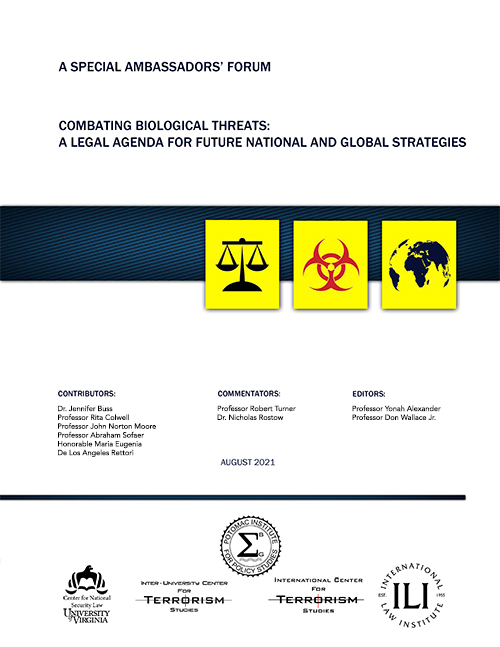 The national, regional, and global spectrum of biological challenges is limitless. Throughout recorded history, these safety concerns stem essentially from two inevitable sources of enduring actual and potential dangers to individuals, communities, societies, and civilizations.
The national, regional, and global spectrum of biological challenges is limitless. Throughout recorded history, these safety concerns stem essentially from two inevitable sources of enduring actual and potential dangers to individuals, communities, societies, and civilizations.
The first critical threat is caused by Mother Nature’s disasters, such as earthquakes, cyclones, and infectious diseases. The second concern is man-made menaces, including violent radicalism, terrorism, and war. The key question is whether the United States and the international community are prepared to identify, prevent, and counter current and future biological threats.
This Preface of the current report on “Combating Biological Threats: A Legal Agenda For Future National And Global Strategies” (August 2021) offers an overview of health and security concerns as well as focusing on a wide-range of juridical topics from legislation to transnational regulation.
MOTHER NATURE AND MAN-MADE BIOLOGICAL THREATS
Biological agents are micro-organisms too small to be seen with the naked eye and can include bacteria, viruses, and fungi. Some of the most serious viral agents are those that produce, for example, smallpox and yellow fever. Bacterial agents can induce the plague and Anthrax.
Biological threats are difficult to control as they require a delivery system, or “vector,” that can make distribution difficult and dangerous. Furthermore, it seems likely that if terrorists were to use a biological weapon, they would probably choose a bacteriological rather than a viral or rickettsial agent due to available countermeasures as well as the difficulty of cultivating viruses.
In addition, toxins, the poisonous byproducts of micro-organisms, plants, and animals, fall somewhere between biological and chemical agents as they are non-living substances. Toxins are relatively easy to manufacture and extremely virulent. Botulinum toxins, for example, can be more toxic than some nerve agents on an equal-weight basis.
Moreover, many agents are considered capable of spreading disease among humans, animals, or plants. Disease develops when people and animals are exposed to infectious micro-organisms or to chemicals which are produced by such organisms. After an incubation period, during which organisms are multiplied, the disease may even cause death. Mention should also be made of a number of fungal pathogens, such as smut of wheat, which is capable of destroying crops as well as resulting in famine and costly diseases.
Despite the wide array of biological challenges, historical and contemporary records provide extensive evidence regarding the nature, intensity, and health security implications of existing threats. These massive data sources also serve as a warning to beware of future catastrophic losses to human lives as well as political, social, economic, and strategic costs to those societies affected by biological pathogen attacks.
For example, in the 14th Century, the Black Plague wiped out 30-60 percent of Europe’s population. Likewise, the 1918 influenza pandemic, regarded as the deadliest in modern times, killed an estimated 50 million people worldwide, about 675,000 of them in the United States. In addition, the Asian flu, originated in China in 1957-1958, resulted in the death of some one to four million people.
More recently, the sudden Ebola outbreak that began in 2014 presented a major health security challenge nationally, regionally, and globally. This deadly disease created unprecedented fear and anxiety over public safety, not only in parts of West Africa, but also in the United States, Europe, and elsewhere.
In fact, the Ebola virus reappeared in the Congo at different times during 2018-2020. Similar outbreaks as well as other contemporary health security challenges are anticipated in the future.
Mention should be made of the Zika virus infection that is spread by mosquitoes (which are also the vectors of many other diseases), sexually, and through blood transfusion as well as laboratory exposure. The disease causes microcephaly and many other birth defects. Another grave humanitarian concern is the cholera epidemic that has occurred in war-torn Yemen where more than 100,000 cases have been recorded by World Health Organization (WHO) sources, a quarter of them children. This disease is caused by bacteria from water or food contaminated with feces.
Supplementing Mother Nature’s biological threats are man-made intentions and capabilities to deploy a wide range of weapons against perceived or actual adversaries in the struggle for power within and among nations. From the dawn of history to modern times numerous theologians, philosophers, politicians, military strategists, scientists, academics, and other participants and observers of the world’s security concerns have underscored the continued trends toward mass destruction capabilities.
In sum, to prevent a potential “Black Plague”- like disaster as well as man-made threats, it behooves all nations to recall the warning in Shakespeare’s King Lear. “We make guilty of our disasters the sun, the moon, and stars, as if we were villains on necessity; fools by heavenly compulsions...” (Act 1, Scene 2).
Bill Gates similarly asserted in a February 2017 Security Conference in Munich that “by the work of nature or the hands of a terrorist...an outbreak could kill tens of millions in the near future unless governments begin to prepare for these epidemics the same way we prepare for war.”
PROFESSOR YONAH ALEXANDER AND PROFESSOR DON WALLACE, JR.
EDITORS
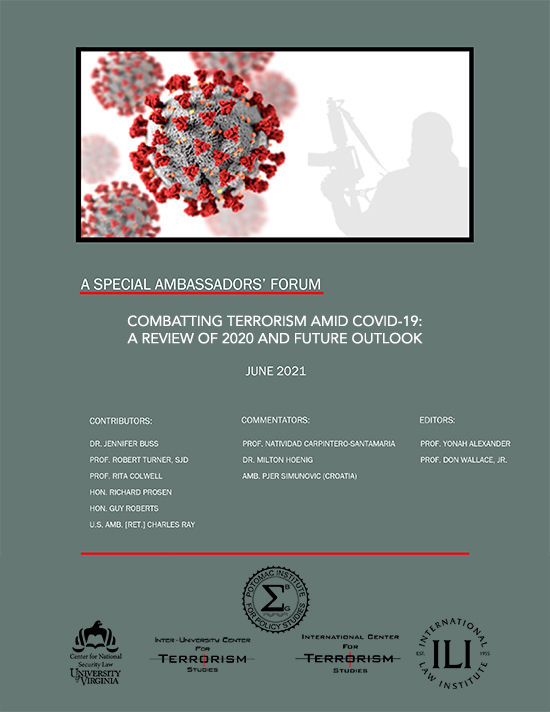 The national, regional, and global spectrum of biological challenges is limitless. Throughout recorded history, these safety concerns stem essentially from two inevitable sources of enduring actual and potential dangers to individuals, communities, societies, and civilizations.
The national, regional, and global spectrum of biological challenges is limitless. Throughout recorded history, these safety concerns stem essentially from two inevitable sources of enduring actual and potential dangers to individuals, communities, societies, and civilizations.
The first critical threat is caused by Mother Nature’s disasters, such as earthquakes, cyclones, and infectious diseases. The second concern is man-made menaces, including violent radicalism, terrorism, and war. The key question is whether the United States and the international community are prepared to identify, prevent, and counter current and future biological threats.
This Preface of the current report on “Combating Terrorism Amid Covid-19: Review of 2020 and Future Outlook” (February 2021) offers an overview of the national and global implications of biological challenges, both natural and man-made, as well as providing a brief academic perspective.
MOTHER NATURE AND MAN-MADE BIOLOGICAL THREATS
Biological agents are micro-organisms too small to be seen with the naked eye and can include bacteria, viruses, and fungi. Some of the most serious viral agents are those that produce, for example, smallpox and yellow fever. Bacterial agents can induce the plague and Anthrax.
Biological threats are difficult to control as they require a delivery system, or “vector,” that can make distribution difficult and dangerous. Furthermore, it seems likely that if terrorists were to use a biological weapon, they would probably choose a bacteriological rather than a viral or rickettsial agent due to available countermeasures as well as the difficulty of cultivating viruses.
In addition, toxins, the poisonous byproducts of micro-organisms, plants, and animals, fall somewhere between biological and chemical agents as they are non-living substances. Toxins are relatively easy to manufacture and extremely virulent. Botulinum toxins, for example, can be more toxic than some nerve agents on an equal-weight basis.
Moreover, many agents are considered capable of spreading disease among humans, animals, or plants. Disease develops when people and animals are exposed to infectious micro-organisms or to chemicals which are produced by such organisms. After an incubation period, during which organisms are multiplied, the disease may even cause death. Mention should also be made of a number of fungal pathogens, such as smut of wheat that is capable of destroying crops as well as resulting in famine and costly diseases.
Despite the wide array of biological challenges, historical and contemporary records provide extensive evidence regarding the nature, intensity, and health security implications of existing threats. These massive data sources also serve as a warning to beware of future catastrophic losses to human lives as well as political, social, economic, and strategic costs to those societies affected by biological pathogen attacks.
For example, in the 14th Century, the Black Plague wiped out 30-60 percent of Europe’s population. Likewise, the 1918 influenza pandemic, regarded as the deadliest in modern times, killed an estimated 50 million people worldwide, about 675,000 of them in the United States. In addition, the Asian flu, originated in China in 1957-1958, resulted in the death of some one to four million people.
More recently, the sudden Ebola outbreak that began in 2014 presented a major health security challenge nationally, regionally, and globally. This deadly disease created unprecedented fear and anxiety over public safety, not only in parts of West Africa, but also in the United States, Europe, and elsewhere.
In fact, the Ebola virus reappeared in the Congo at different times during 2018-2020. Similar outbreaks as well as other contemporary health security challenges are anticipated in the future.
Mention should be made of the Zika virus infection that is spread by mosquitoes (which are also the vectors of many other diseases), sexually, and through blood transfusion as well as laboratory exposure. The disease causes microcephaly and many other birth defects. Another grave humanitarian concern is the cholera epidemic that has occurred in war-torn Yemen where more than 100,000 cases have been recorded by World Health Organization (WHO) sources, a quarter of them children. This disease is caused by bacteria from water or food contaminated with feces.
Supplementing Mother Nature’s biological threats are man-made intentions and capabilities to deploy a wide range of weapons against perceived or actual adversaries in the struggle for power within and among nations. From the dawn of history to modern times numerous theologians, philosophers, politicians, military strategists, scientists, academics, and other participants and observers of the world’s security concerns have underscored the continued trends toward mass destruction capabilities.
In sum, to prevent a potential “Black Plague”- like disaster as well as man-made threats, it behooves all nations to recall the warning in Shakespeare’s King Lear. “We make guilty of our disasters the sun, the moon, and stars, as if we were villains on necessity; fools by heavenly compulsions...” (Act 1, Scene 2).
Bill Gates similarly asserted in a February 2017 Security Conference in Munich that “by the work of nature or the hands of a terrorist...an outbreak could kill tens of millions in the near future unless governments begin to prepare for these epidemics the same way we prepare for war.”
PROFESSOR YONAH ALEXANDER AND PROFESSOR DON WALLACE, JR.
EDITORS
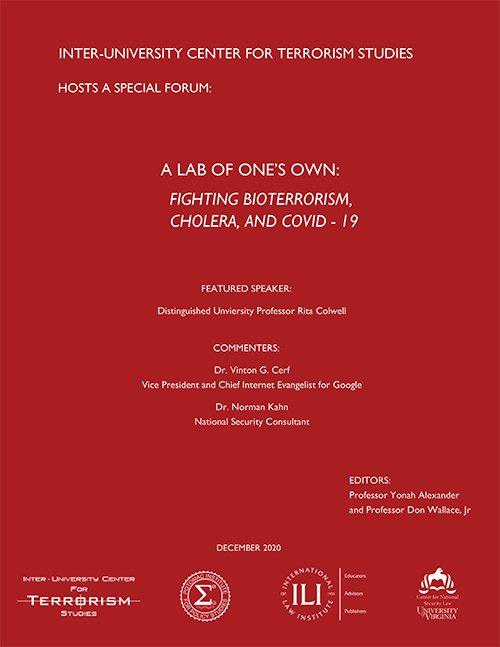 The national, regional, and global spectrum of biological challenges is limitless. Throughout recorded history, these safety concerns stem essentially from two inevitable sources of enduring actual and potential dangers to individuals, communities, societies, and civilizations.
The national, regional, and global spectrum of biological challenges is limitless. Throughout recorded history, these safety concerns stem essentially from two inevitable sources of enduring actual and potential dangers to individuals, communities, societies, and civilizations.
The first critical threat is caused by Mother Nature’s disasters, such as earthquakes, cyclones, and infectious diseases. The second concern is man-made menaces, including violent radicalism, terrorism, and war. The key question is whether the United States and the International Community are
prepared to identify, prevent, and counter current and future biological threats.
This Preface of the current report on “A Lab of One’s Own: Fighting Bioterrorism, Cholera, and COVID-19” (December 2020) offers an overview of the national and global implications of biological challenges, both natural and man-made, as well as providing a brief academic perspective.
To read the report click here
PROFESSOR YONAH ALEXANDER AND PROFESSOR DON WALLACE, JR., EDITORS
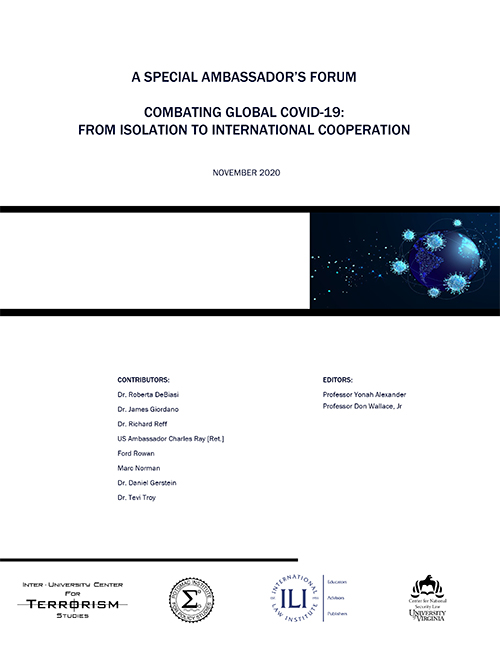 The national, regional, and global spectrum of biological challenges is limitless. Throughout recorded history, these infinite safety concerns stem essentially from two inevitable sources of enduring actual and potential dangers to individuals, communities, societies, and civilizations.
The national, regional, and global spectrum of biological challenges is limitless. Throughout recorded history, these infinite safety concerns stem essentially from two inevitable sources of enduring actual and potential dangers to individuals, communities, societies, and civilizations.
The first critical threat is caused by Mother Nature’s disasters, such as earthquakes, cyclones, and infectious diseases. The second concern is man-made menaces, including violent radicalism, terrorism, and war. The key question then is whether the United States and the International Community are prepared to identify, prevent, and counter current and future biological threats.
The Preface of our current Report on “Combating Global COVID-19: From Isolation to International Cooperation” (November 2020) offers an overview of the nature and global implications of biological challenges, both natural and man made, as well as provides a brief academic perspective of the editors of this timely publication.
Read the full report here
PROFESSOR YONAH ALEXANDER AND PROFESSOR DON WALLACE, JR., EDITORS
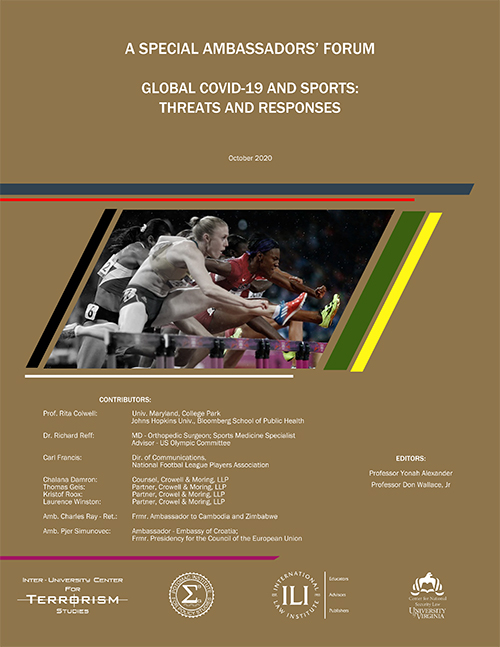 The national, regional, and global spectrum of biological challenges is limitless. Throughout recorded history, these infinite safety concerns stem essentially from two inevitable sources of enduring actual and potential dangers to individuals, communities, societies, and civilizations.
The national, regional, and global spectrum of biological challenges is limitless. Throughout recorded history, these infinite safety concerns stem essentially from two inevitable sources of enduring actual and potential dangers to individuals, communities, societies, and civilizations.
The first critical threat is caused by Mother Nature’s disasters, such as earthquakes, cyclones, and infectious diseases. The second concern are man-made menaces, including violent radicalism, terrorism, and war. The key question then is whether the United States and the International Community are prepared to identify, prevent, and counter current and future biological threats.
In this connection our current academic and professional effort is publishing a Report on “Global COVID-19 and Sports: Threats and Responses” that consists of contributions by invited interdisciplinary panelists at our recent Ambassadors’ Forum on “Global Covid-19 and Sports: Threats and Responses” that was held on July 30, 2020, via Zoom conferencing and hosted by the International Law Institute (ILI) and the Inter-University Center for Terrorism Studies (IUCTS). Speakers at this Ambassadors’ Forum included Distinguished University Professor Rita Colwell (University of Maryland College Park and Johns Hopkins University. Bloomberg School of Public Health); Dr. Richard B. Reff, MD (Orthopedic Surgeon and Sports Medicine Specialist); Carl Francis (Director of Communication at the National Football League Players Association); Chalana Damron, Tom Gies, Kristof Roox (attorneys at Crowell & Moring); Ambassador (Ret.) Charles Ray (a former U.S. diplomat and military officer); and Ambassador Pjer Simunovic at the Embassy of Croatia (holding the Presidency of the Council of the European Union). Subsequently, Laurence Winston, an attorney also at Crowell & Moring contributed to the current Report as well.
It should also be noted that in view of the significant role of law in planning for the security, health, business, and sports world in the shadow of the continuing coronavirus pandemic, we decided, with the approval of Crowell & Moring, to also publish a Monograph on “Global Covid-19 and Sports: Exposure Claims and Liability Mitigation Considerations”. The authors of this publication were the attorneys from Crowell Moring LLP, namely, Chalana Damron, Thomas P. Gies, Kristof Roox, and Laurence Winston. The abbreviated version of the Monograph is incorporated in the current, slightly edited and updated, Report.
This Preface provides a brief academic context from the perspectives of the Editors of this publication as well as relevant Acknowledgements.
To read the full report click here
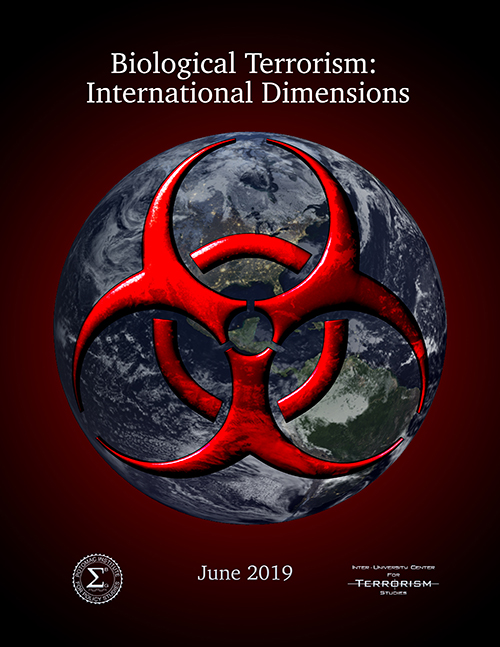 Biological security concerns, ranging from Mother Nature to man-made threats by state and non-state actors, transcend geographic regions. In 2018 and early 2019 alone, the Ebola virus has broken out in the Congo, cholera has afflicted war-torn Yemen, North Korea has augmented its biological warfare capabilities, and the Islamic State has demonstrated a willingness to pursue the use of biological weapons. These looming biological threats pose continual and unprecedented security challenges to those in the U.S. and abroad.
Biological security concerns, ranging from Mother Nature to man-made threats by state and non-state actors, transcend geographic regions. In 2018 and early 2019 alone, the Ebola virus has broken out in the Congo, cholera has afflicted war-torn Yemen, North Korea has augmented its biological warfare capabilities, and the Islamic State has demonstrated a willingness to pursue the use of biological weapons. These looming biological threats pose continual and unprecedented security challenges to those in the U.S. and abroad.
Is the international community prepared to identify, prevent, counter, and respond to future biological challenges? What are the past lessons, emerging risks, and needed strategies nationally, regionally, and globally?
The following report on “Biological Terrorism: International Dimensions” is based off the remarks given by experts from the security and health communities during a special seminar held on March 28, 2019 at the International Law Institute in Washington, D.C. The distin-guished panel included: Dr. Larry Kerr (Director, Pandemics and Emerging Threats, Office of Global Affairs, U.S. Department of Health and Human Services); Professor Rita Colwell (Distinguished University Professor at the University of Maryland, College Park and Johns Hopkins University Bloomberg School of Public Health, and Senior Fellow, Potomac Institute for Policy Studies); Dr. Daniel M. Gerstein (Senior Policy Researcher, Rand Corporation, and Former Acting Undersecretary and Deputy Undersecretary in the Science and Technology Directorate, Department of Homeland Security); Dr. Gerald L. Epstein (Distinguished Research Fellow at the Center for the Study of Weapons of Mass Destruction, National Defense University); and Dr. Meghan Delaney (Chief of Pathology and Laboratory Medicine & Medical Director for Transfusion Medicine, Children’s National Medical Center, and Associate Professor of Pathology & Pediatrics, George Washington University). Professor Yonah Alexander (Director, Inter-University Center for Terrorism Studies, and Senior Fellow, Potomac Institute for Policy Studies) moderated the discussion and General Al Gray (Twenty-Ninth Commandant of the U.S. Marine Corps, and Senior Fellow and Chairman of the Board of Regents, Potomac Institute for Policy Studies) provided closing remarks.
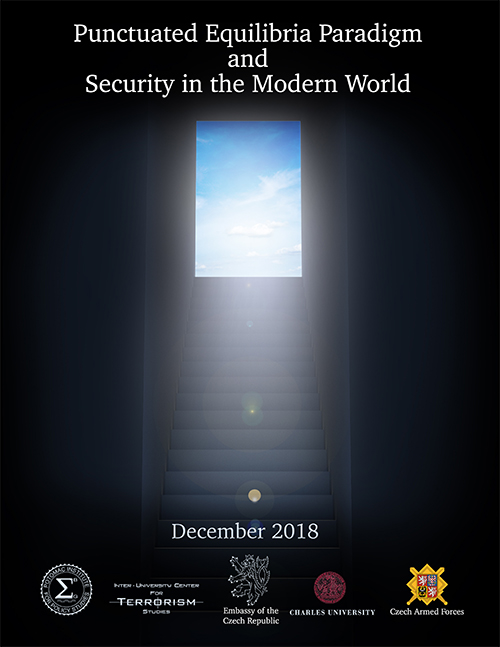 An assessment of contemporary national, regional, and global security concerns may cause one to recall two ancient warnings . The first is attributed to Job: “for all the things which I greatly fear is come upon me, and that which I was afraid of is come unto me .” The second describes the four horsemen of the apocalypse representing agents of conquest, famine, war, and death, and perhaps even ushering in the beginning of the end of the world .
An assessment of contemporary national, regional, and global security concerns may cause one to recall two ancient warnings . The first is attributed to Job: “for all the things which I greatly fear is come upon me, and that which I was afraid of is come unto me .” The second describes the four horsemen of the apocalypse representing agents of conquest, famine, war, and death, and perhaps even ushering in the beginning of the end of the world .
Indeed, since the dawn of recorded history, predicting, preventing, mitigating and bringing these and related individual and collective challenges under manageable levels have been a permanent fixture of humanity’s saga . The current report on “Punctuated Equilibria Paradigm and Security in the Modern World” is one of the most recent efforts to provide broader academic analysis on the complex threats and responses involved .
The distinguished contributors to this report initially presented papers on this topic at a special seminar held on February 27, 2018 in Arlington, VA under the co-sponsorship of the Potomac Institute for Policy Studies, the Inter-University Center for Terrorism Studies, the Embassy of the Czech Republic in Washington, D .C ., Charles University in Prague, and the Chief of Staff of the Czech Armed Forces . More details on this event will be discussed subsequently in this Introduction . At this stage, a brief academic context is in order .
More specifically, the theories of “Punctuated Equilibria” and “Multiplier Effect” have been gain- ing importance and significance, including to militaries around the world . Developed versions adapted to complex societies may be considered one of the most promising and strategic avenues of research in the social sciences . These two theoretical tools offer a way to anticipate major events and conflicts that may come into being and that better knowledge of the universal processes and laws governing any complex society is of critical importance for the 21st century .
View the full report Here.
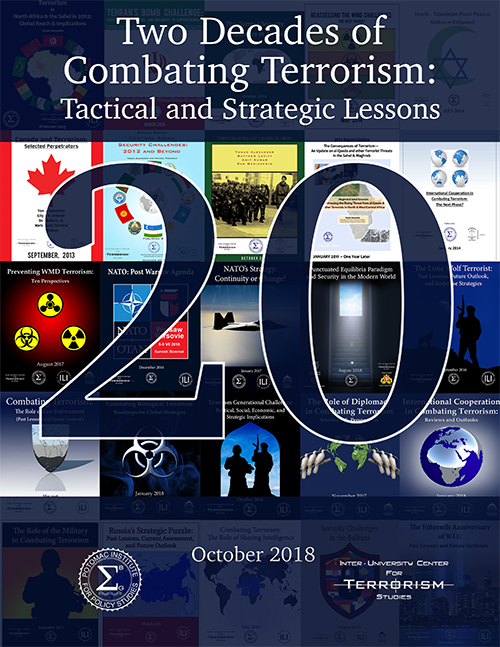 An enduring fixture of international affairs is the fact that, throughout the history of the world, nothing is static . Empires, countries, communities, and nearly entire civilizations have risen and declined while others became engaged in an endless struggle for power within and among social and political identifiable structures.
An enduring fixture of international affairs is the fact that, throughout the history of the world, nothing is static . Empires, countries, communities, and nearly entire civilizations have risen and declined while others became engaged in an endless struggle for power within and among social and political identifiable structures.
It is not surprising, then, that two historical lessons spring to mind when considering these socio- political fluctuations. The first recalls the old Chinese proverb which reads, “One who studies the past, knows the future” and the second observation, attributed to Hegel, asserts that “We learn from history that we do not learn from history.”
Indeed, these truisms have echoed continuously throughout the ages of different cultures and peoples located in every geopolitical region. The experience of the Balkans from antiquity to modernity demonstrates both evolutionary and revolutionary developments of triumph and calamity with broader significant strategic implications.
From the dawn of history, humanity has continuously faced two critical security challenges. The first is “natural”, or “Mother Nature’s”, disasters. It includes a wide range of disruptions and destruction to human lives and property. Hurricanes, tornadoes, earthquakes, tsunamis, monsoons, droughts, floods, heat waves, wildfires, and varieties of pandemics arising from biological pathogens, cause some of the most frequent catastrophic costs to individuals, communities, and civilizations.
The second permanent and equally significant security concern consists of “man-made” threats such as technological and economic calamities, ideological and political radicalization and extremism, terrorism, insurgencies, and wars.
Both challenges represent security concerns that include the safety, welfare, and rights of ordinary people; the stability of the state system; the success of national, regional and global economic development; the expansion of liberal democracies; and perhaps, even the survival of civilization itself.
Consider, for example, several landmark historical anniversaries related to the dual-danger from “natural” and “manmade” challenges. First, in 1918 an influenza pandemic, often regarded as the deadliest in modern times, killed an estimated 50-100 million people worldwide. Moreover, the Asian flu originated in 1957-1958 and caused the death of some one to four million individuals. Mention should be made of the deadly Ebola virus that represented a major health security challenge with unprecedented fear and anxiety over public safety around the world. Other current infection challenges include the Zika virus, which causes microcephaly and other birth defects, as well as the cholera epidemic, spread by bacteria from water or food contaminated with feces, which is alarmingly expanding in war-torn Yemen. In short, the expansion of pandemic outbreaks of deadly infectious disease is only a matter of time. The Centers for Disease Control and Prevention recently reported that during the 2015-2017 period, it had already “monitored more than 300 outbreaks in 160 countries, tracking 37 dangerous pathogens in 2016 alone.”
Another century-old landmark event occurred on June 28, 1914, when the Archduke Frank Ferdinand, heir to the Austrian-Hungarian throne and his wife, Sophie, were assassinated in Sarajevo. This tragic attack perpetrated by Gavrilo Princip, a young Bosnian terrorist, triggered a series of escalating diplomatic and military moves in Europe and beyond that contributed, at least partly, to the outbreak of World War I. The resulting horrific human and political costs eventually caused the Second World War, with all its unprecedented national and global consequences, and subsequently led to the Cold War and the escalation of terrorism throughout the world . And thus, in the past four decades, terrorism has evolved further. On November 4 1979, Iranian “radicals” seized the U.S. Embassy in Tehran and held the American diplomats captive for 444 days. Also, in 1998 U.S. embassies in Kenya and Tanzania were attacked by al-Qaeda members and on September 11, 2001 bin Laden’s operatives perpetrated the most devastating terrorist attack in world history, to name a few key events.
Since this report focuses on “Two Decades of Combating Terrorism: Tactical and Strategic Lessons, a brief overview is provided on some related threats and responses to be followed by an academic context and the selected contributions by colleagues over the past twenty years.
View the full report here
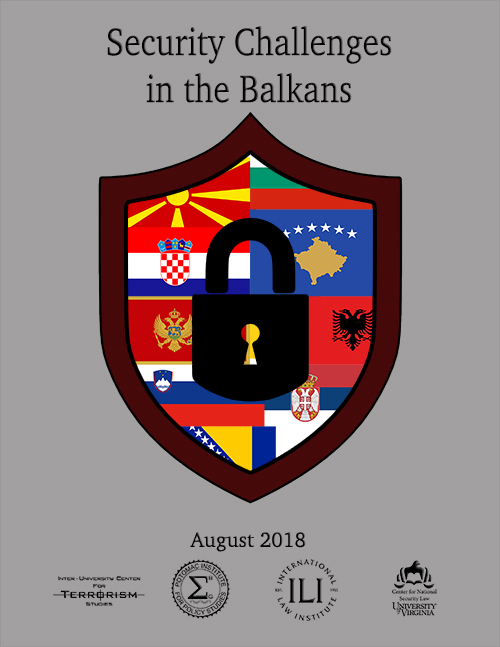 An enduring fixture of international affairs is the fact that, throughout the history of the world, nothing is static . Empires, countries, communities, and nearly entire civilizations have risen and declined while others became engaged in an endless struggle for power within and among social and political identifiable structures .
An enduring fixture of international affairs is the fact that, throughout the history of the world, nothing is static . Empires, countries, communities, and nearly entire civilizations have risen and declined while others became engaged in an endless struggle for power within and among social and political identifiable structures .
It is not surprising, then, that two historical lessons spring to mind when considering these socio- political fluctuations . The first recalls the old Chinese proverb which reads, “One who studies the past, knows the future” and the second observation, attributed to Hegel, asserts that “We learn from history that we do not learn from history .”
Indeed, these truisms have echoed continuously throughout the ages of different cultures and peoples located in every geopolitical region . The experience of the Balkans from antiquity to mo- dernity demonstrates both evolutionary and revolutionary developments of triumph and calamity with broader significant strategic implications .
More specifically, among the numerous memorable historical regional phases, mention should be made of the Byzantine Empire (330 – 1453), the Serbian Kingdom (929 – 1389), the Ottoman Sultanate (1354 – 1922), and the Balkan Wars (1912 – 1913) . Subsequently, over a century ago, on June 28, 1914, the Archduke Franz Ferdinand, heir to the Austro-Hungarian throne and his wife, Sophie, were assassinated in Sarajevo . This tragic attack perpetrated by Gavrilo Princip, a young Bosnian terrorist, triggered a series of escalated diplomatic and military moves in Europe and beyond that contributed, at least partly, to the outbreak of World War I .
One of the resulting outcomes of the “War to end all Wars” was the formation of the “Kingdom of Serbs, Croats, and Slovenes,” who regained control of Kosovo . And on December 1, 1918, Yugoslavia was established over the territories formerly inhabited by the Austrian and Ottoman empires .
It should be noted that the Albanians in Kosovo claimed that their minority rights were not implemented by the Serbs in the inter-war period . The Serbs, on the other hand, charged the Albanians of fermenting discontent in Kosovo . During the Second World War, Albania was annexed by Italy and later was occupied by Germany . Moreover, Berlin established a puppet government in Serbia, Croatia joined the Axis powers, and Slovenia became under German influenceIn.
1945, the Socialist Federal Republic of Yugoslavia was established and the Communist party of Yugoslavia was elected into power . That year, the United States recognized the new republic under Josip Broz Tito . Interestingly, in 1948, Yugoslavia was removed from the Cominform (a coordinated body headed by the Soviet Union for communist parties in Europe) as the result of disputes with Moscow . By 1953, Marshall Tito was named President of Yugoslavia and ten years later became president for life . He died on May 4, 1980 .
Following the fall of the Berlin Wall in 1989 and the collapse of the Soviet Union and Communism in Eastern Europe, Croatia and Slovenia declared independence from Yugoslavia in 1991 and Bosnia-Herzegovina also broke away from the federal republic in 1992 . In response to these de- velopments, the Serbian military invaded portions of Croatia and Bosnia resulting in the ethnic cleansing and bitter hostilities between the antagonists . The costly Balkan wars led to the signing of the Dayton Accord in 1995, which outlined a future peace process involving Croatian, Bosnian, and Serbian leaders . By March 1998, hostilities began in Kosovo between the ethnic Albanians and Serbs and a year later, NATO launched a 78-day air attack on Serbian targets . On February 17, 2008, Kosovo unilaterally declared its independence from Serbia but tensions between the parties remained high .
Sadly, some ten years later, the deep-seated mistrust in the region has risen again . A recent example of this challenge occurred on January 16, 2018, with the assassination of Oliver Ivanovic, a Kosovan Serb leader of the civic initiative, Freedom, Democracy, Justice (SDP) by an unknown gunman . This attack took place on the day that talks to normalize relations between Kosovans and Serbs, mediated by the European Union (EU), were to be held . This scheduled meeting was predictably aborted . NATO, which has maintained a peacekeeping force in the region since 1999, following the Kosovan War, has urged all the parties to show constraint and return to the negotiating table .
To be sure, NATO’s overall impact in the Balkans has been positive with regards to establishing early warning systems, and intelligence gathering to prevent political crises, upholding the rights of the people to return to their homes, and providing emerging regional democracies with incentives for reforms . Moreover, Albania, Croatia, Montenegro, and Slovenia are currently members of NATO and other states of the former Yugoslavian country are, to varying degrees, closer in association with NATO as well as the EU . Other countries with historical relationships and current interests in the Balkans such as Bulgaria, Greece, Romania, and Turkey, are already members of the alliance and are continuing to support NATO mission in Europe and around the globe .
Another significant aspect of security concerns in the region is the challenge of terrorism and the efforts to combat non-state actors such as al-Qa’ida and the Islamic State, to mention a few . For instance, Albania, Bosnia Herzegovina, Kosovo, Macedonia, and Serbia are continu- ing their participation in the Global Coalition to Defeat ISIS and are engaged in multiplecounter-terrorism activities, including introducing legislation, law enforcement border security, countering the financing of terrorism, combating violent extremism, and participating in inter- national and regional cooperation .
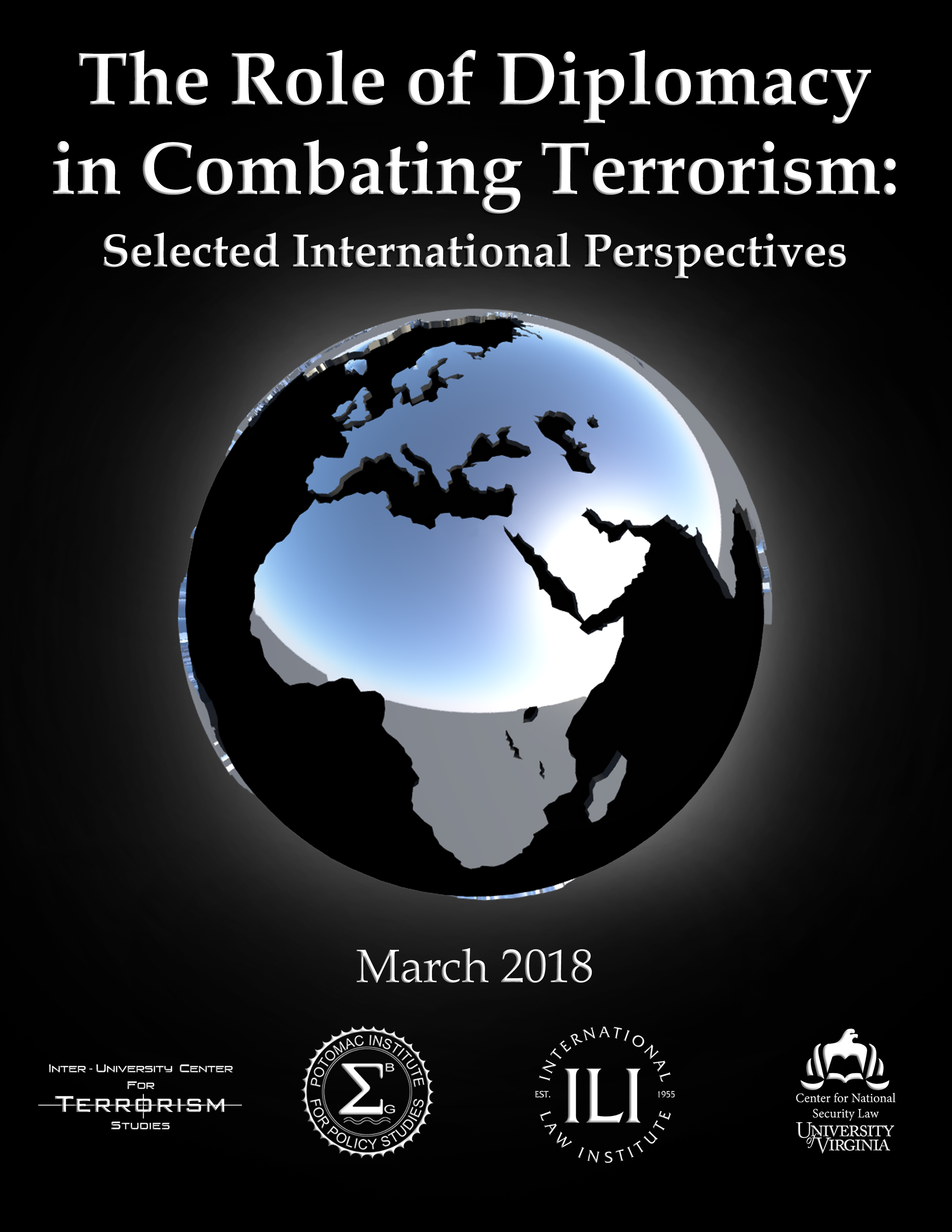 From the dawn of history “diplomacy” has been utilized as a permanent mode of statecraft in the struggle for power within and among nations during peace and war.The purpose of this March 2018 report on “The Role of Diplomacy in Combating Terrorism: Selected International Perspectives” is to highlight insights from foreign diplomats on threats and challenges to officials and their missions, analysis of statecraft, and “best practices” responses to radicalization and violence.
From the dawn of history “diplomacy” has been utilized as a permanent mode of statecraft in the struggle for power within and among nations during peace and war.The purpose of this March 2018 report on “The Role of Diplomacy in Combating Terrorism: Selected International Perspectives” is to highlight insights from foreign diplomats on threats and challenges to officials and their missions, analysis of statecraft, and “best practices” responses to radicalization and violence.
Download the report here
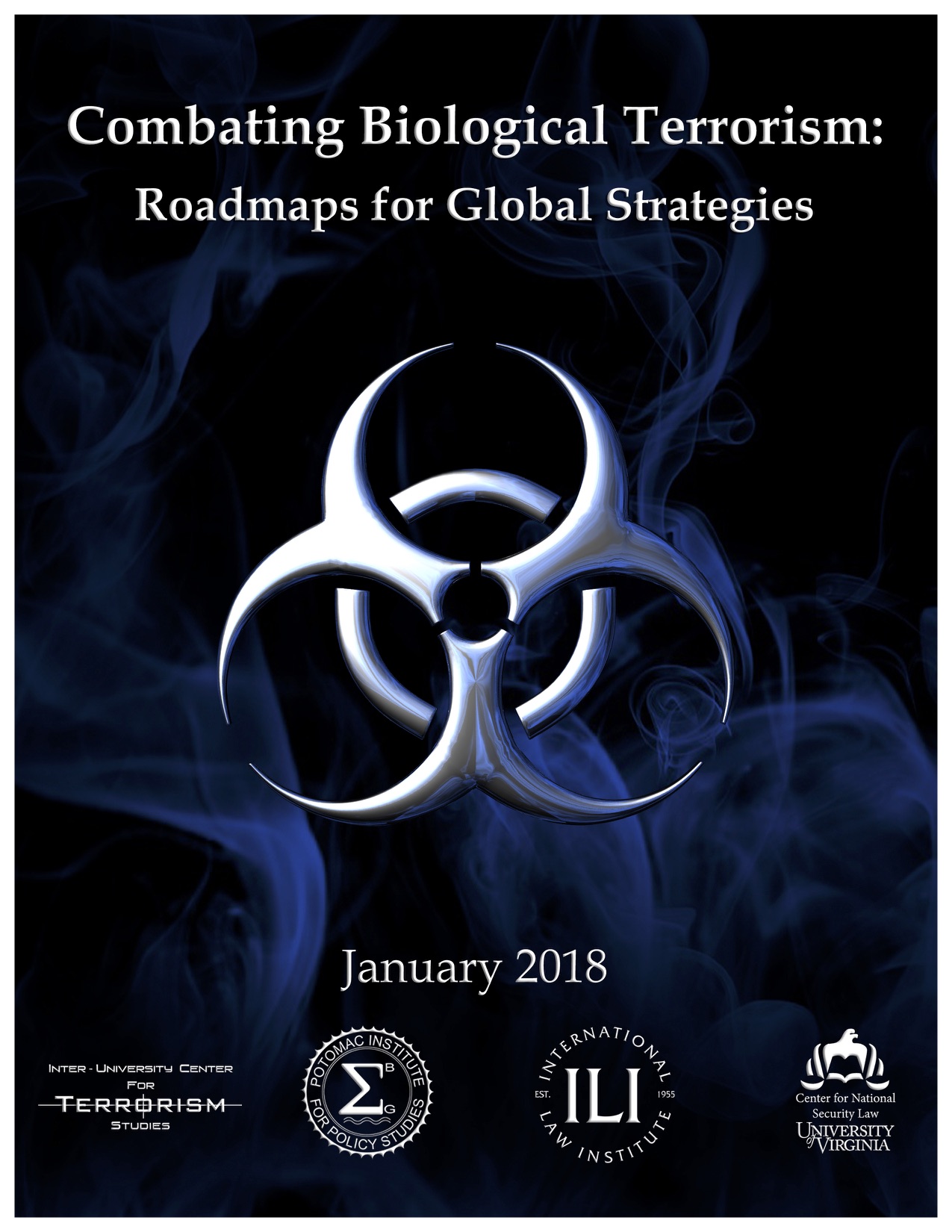 Recent epidemics, such as Ebola and Zika, and the potential dangers of biological terrorism from both state and non-state actors highlight the urgent need to address these challenges through international partnerships and comprehensive biosecurity strategies to reduce the gravest health risks at home and abroad.
Recent epidemics, such as Ebola and Zika, and the potential dangers of biological terrorism from both state and non-state actors highlight the urgent need to address these challenges through international partnerships and comprehensive biosecurity strategies to reduce the gravest health risks at home and abroad.
This January 2018 report on “Combating Biological Terrorism: Roadmaps for Global Strategies” follows several earlier related publications, such as “Biological Terrorism: Past Lessons and Future Outlook” (June 2017) and “Preventing WMD Terrorism: Ten Perspectives” (August 2017).
Download the report here.
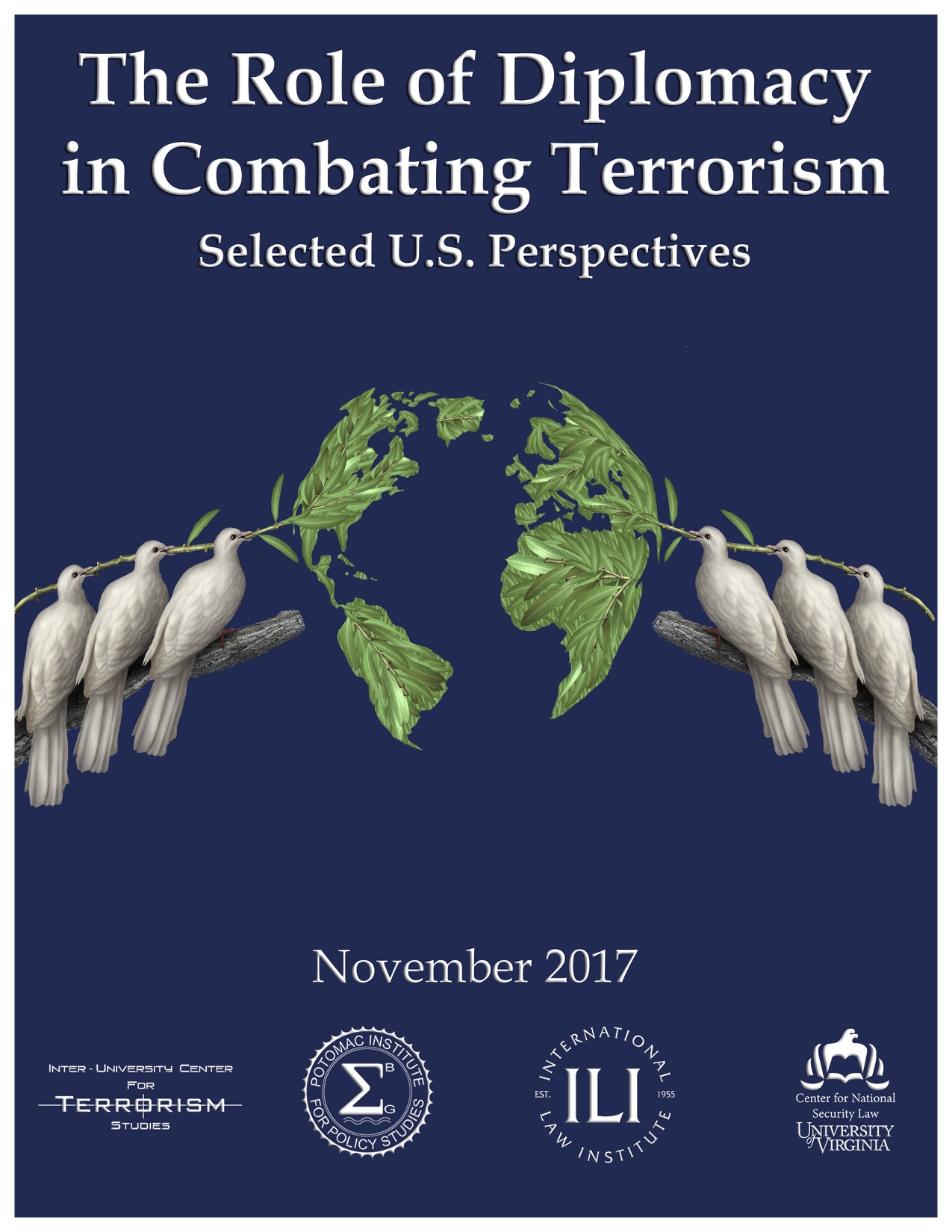 In view of the multiple security challenges to international peace and order posed by the intensification of terrorist attacks for over the past half-century, governmental, intergovernmental, and nongovernmental bodies have developed tactical and strategic responses on national, regional, and global levels. The role of diplomacy is, indeed, a critical element in the evolving process. The purpose of this report on “The Role of Diplomacy in Combating Terrorism: Selected U.S. Perspectives” to focus specifically on the role of diplomacy in combating terrorism relevant to experiences of the United States and their implications internationally. The key question is whether the U.S. and the international community is capable of crafting adequate responses to terrorism, diffusing expanding conflicts regionally and inter-regionally, engaging in constructive peace processes, and striking a delicate balance between security measures and democratic value systems.
In view of the multiple security challenges to international peace and order posed by the intensification of terrorist attacks for over the past half-century, governmental, intergovernmental, and nongovernmental bodies have developed tactical and strategic responses on national, regional, and global levels. The role of diplomacy is, indeed, a critical element in the evolving process. The purpose of this report on “The Role of Diplomacy in Combating Terrorism: Selected U.S. Perspectives” to focus specifically on the role of diplomacy in combating terrorism relevant to experiences of the United States and their implications internationally. The key question is whether the U.S. and the international community is capable of crafting adequate responses to terrorism, diffusing expanding conflicts regionally and inter-regionally, engaging in constructive peace processes, and striking a delicate balance between security measures and democratic value systems.
Download the report here.
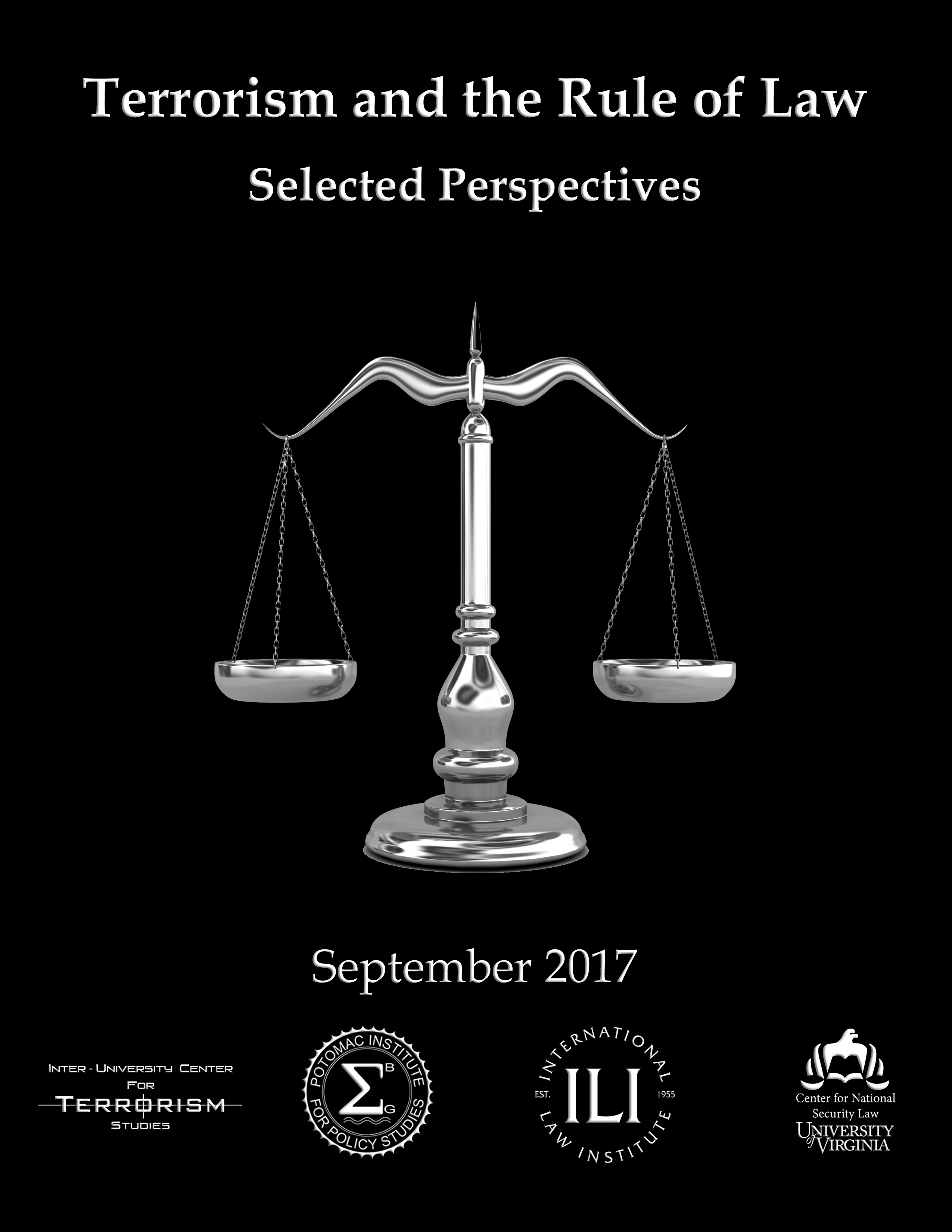 Ensuring the safety and interests of citizens at home and abroad continues to be every government’s paramount responsibility. The purpose of this report is to focus on the interface between terrorism and the rule of law. The key question is whether nations can strike a balance between security concerns and protecting civil liberties and constitutional order.
Ensuring the safety and interests of citizens at home and abroad continues to be every government’s paramount responsibility. The purpose of this report is to focus on the interface between terrorism and the rule of law. The key question is whether nations can strike a balance between security concerns and protecting civil liberties and constitutional order.
“Terrorism and the Rule of Law: Selected Perspectives” features presentations by experts with extensive academic and government experience. Some of the topics covered include the “War on Terror,” the role of intelligence, law enforcement, detention, civil and military trials, punishment of terrorists, hostage-taking, and other relevant issues.
Download the report here.
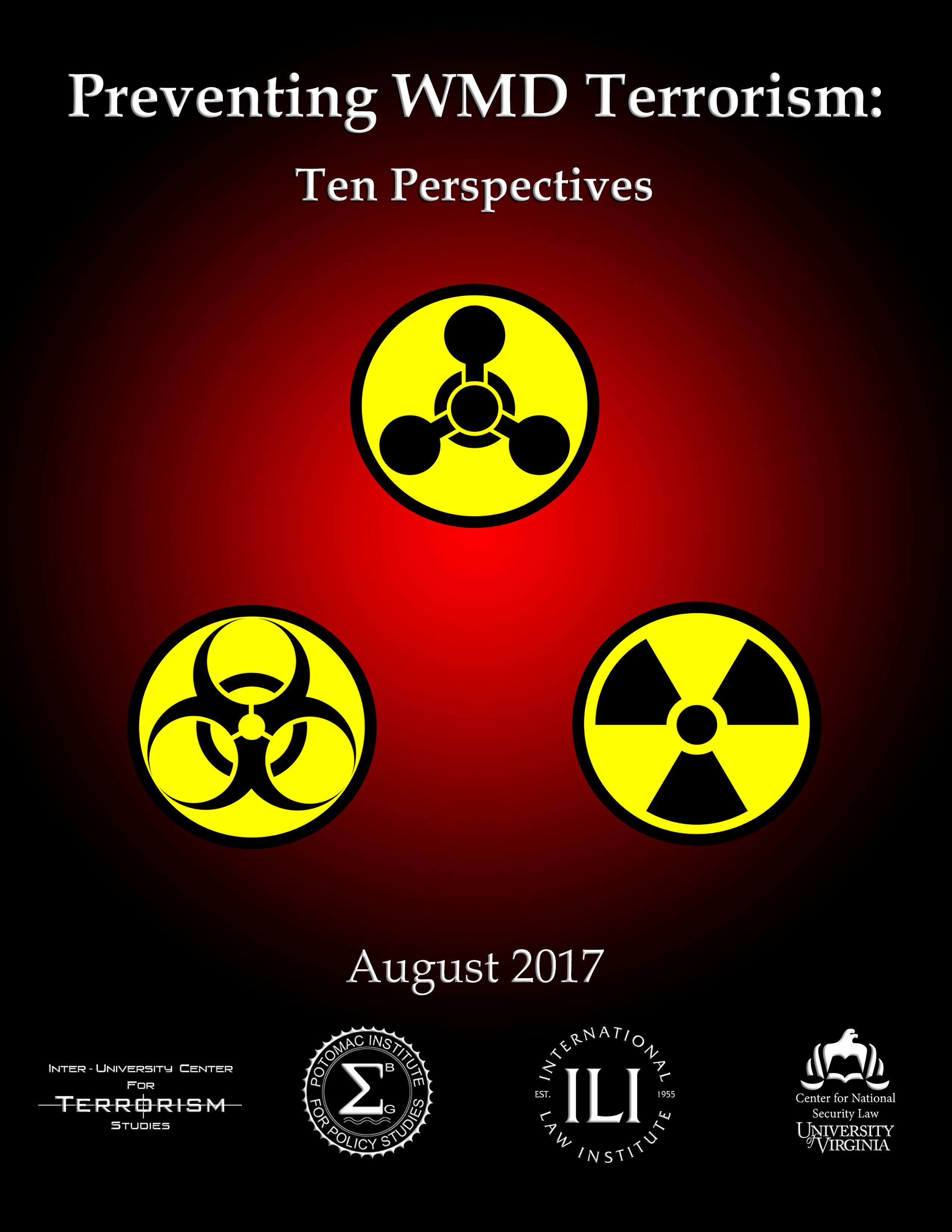
Preventing the proliferation of biological, chemical, radiological, and nuclear weapons has been a major priority for many nation states in the post-World War II era. Additionally, in the aftermath of 9/11, there has been a growing awareness globally of the potential dangers posed by terrorist groups who may resort to WMD capabilities.
The purpose of this report on “Preventing WMD Terrorism: Ten Perspectives” is to provide some recent insights from experts on lessons learned, assessments of future challenges, and offer recommendations on response strategies to reduce the risk on national and international levels.
Download the report here.
International Center for Terrorism Studies (ICTS)
ICTS Leadership
 Professor Yonah Alexander, Ph.D., Member, Board of Regents, Senior Fellow, and Director, International Center for Terrorism Studies
Professor Yonah Alexander, Ph.D., Member, Board of Regents, Senior Fellow, and Director, International Center for Terrorism Studies
Professor Yonah Alexander is a Member of the Board of Regents, Senior Fellow, and Director of International Center for Terrorism Studies at the Potomac Institute for Policy Studies. In addition, Professor Alexander is the Director of the Inter-University Center for Terrorism Studies and Director of the Inter-University Center for Legal Studies (in Washington, D.C.). Both academic institutions are consortia of universities and think tanks throughout the world. Previously, Dr. Alexander served as Professor of International Affairs and Director of Terrorism Studies at the George Washington University as well as Professor of International Studies and Director of the Institute for Studies in International Terrorism at the State University of New York system, totaling 35 years of service.
Education at Columbia University (PhD), the University of Chicago (MA), and Roosevelt University of Chicago (BA), Professor Alexander taught at: The George Washington University, The American University, The Columbus School of Law at Catholic University of America, Tel Aviv University, The City University of New York, and The State University of New York.
His research experience includes such appointments as: Research Professor of International Affairs and Visiting Professor of Law, The George Washington University; Director, “Terrorism, Gray Area and Low Level Conflict,” U.S. Global Strategy Council; Senior Fellow, The Institute for Advanced Studies in Justice, School of Law, The American University; Research Associate, School of Journalism, Columbia University; Senior Staff Member, Center for Strategic and International Studies, Georgetown University; Director, Institute for Studies in International Terrorism, State University of New York; and Fellow, Institute of Social Behavior Pathology, The University of Chicago. He is a member, International Institute of Strategic Studies (London) and other professional bodies. Additionally, he has served as academic advisor to governments and international organizations (e.g. UN, NATO, OSCE).
Dr. Alexander is founder and editor-in-chief of five academic international journals: Terrorism; Minorities and Group Rights; Political Communication and Persuasion; NATO’s Partnership for Peace Review; and Terrorism: An Electronic Journal & Knowledge Base. He also has published over 100 books including al-Qa’ida: Ten Years After 9/11 and Beyond; Terrorists in Our Midst: Combatting Foreign Affinity Terrorism in America; Evolution of U.S. Counterterrorism Policy (three volumes); Turkey: Terrorism, Civil Rights, and the European Union; The New Iranian Leadership: Terrorism, Nuclear Ambition, and the Middle East Conflict; and Counterterrorism Strategies: Success and Failures of Six Nations. His latest books are NATO: From Regional to Global Security Provider and The Islamic State: Combatting the Caliphate Without Borders, both published by Lexington Books in 2015. His works were translated into more than two dozen languages. Professor Alexander’s personal papers and collection on terrorism are housed at the Hoover Institution Library and Archives at Stanford University.
He received numerous academic and professional awards and grants from private and public foundations (e.g the John Lyman Prize for the book, Terror on the High Seas: From Piracy to Strategic Challenge). Professor Alexander has appeared on many television and radio programs in over 40 countries. His numerous articles and interviews were published in both the United States and the international press.
ICTS Purpose and Scope
1. To monitor current and future threats of terrorism;
2. To develop response strategies on governmental and non-governmental levels;
3. To effect continual communication with policy-makers, academic institutions, business, media, and civic organizations;
4. To sponsor research programs on critical issues, particularly those relating enabling technologies with policy, and share findings nationally and internationally.
ICTS Events
ICTS Events
Combating Terrorism Amid COVID-19: A Review of 2020 and Future Outlook
IUCTS State Sponsored Terrorism:Challenges for 2022 and Beyond
IUCTS Preventing Nuclear Terrorism in Ukraine and Beyond: International Dimensions
Ukrainian Humanitarian Crisis: Lessons for Preventing the Next Genocide?
ICTS Books
In this breakthrough book, General Al Gray and Dr. Paul Otte provide a new model for achieving a higher level of leadership. This book validates the struggles of the Conflicted Leader – one who must lead individuals and organizations as our world moves through ever-evolving waves of change. But, the authors do more than address what many leaders today are experiencing. They propose a new way of making a difference though Vantage Leadership, defined as the ability to embrace uncertainty, see the possible over the probable, remain conceptual through conflict, and more.
“If you only look for leadership in the usual places, you will only find the usual leadership.”
PRAISE FOR
The Conflicted Leader and Vantage Leadership
“In 1989, the U.S. Marine Corps promulgated a small book entitled Warfighting for all Marines. The intent was to describe General Al Gray’s philosophy on warfighting and to encourage leaders at all levels to use the Maneuver Warfare concepts and values as a way of thinking to meet the challenges of both combat and life. Now General Gray and Dr. Paul Otte have taken these principles and applied them to the everyday challenges of leadership in a complex and uncertain world. Understanding and using the concepts in this book will serve well all who aspire to lead and succeed at any level”
– Brent Scowcroft
Air Force Lt. General (Ret) and former National Security Advisor to President Gerald Ford and President George H.W. Bush
“General Al Gray’s leadership profoundly changed the US Marine Corps, US policy, and the way the US Military fights today in hundreds of ways. His unique form of leadership inspires all who come in contact with him. General Gray and Dr. Paul Otte have successfully outlined these principles of leadership in a fashion that will continue to inspire and guide people for generations to come.”
– Michael S. Swetnam
CEO and Chairman
Potomac Institute for Policy Studies
“The Conflicted Leader and Vantage Leadership provides a fresh perspective to the study of leadership, providing a basis for developing leadership concepts, ideas, and ideals that apply to you. This book is a “must read” for the serious student of leadership.
– Robert L. Bailey
Retired CEO, Chairman and President – State Auto Insurance Companies
Author of “Plain Talk About Leadership”
“The Marine Warfighting philosophy published by General Gray in 1989 contains concepts, values, and wisdom that helped transform the Marine Corps. Now, General Gray and his writing partner Dr. Paul Otte have captured these thoughts in a superb book. If you want to know why the Marines win – read this. You can us the same principles in your in your business or professional life.”
– David C. Miller, Jr.
Ambassador of the United Sates (Retired)
and former Special Assistant to President George H. W. Bush
“General Gray and Dr. Otte have advanced significantly the discourse on leadership for our modern age. Happily, one will not find in this work any endorsement of manipulative leadership so in evidence today, with its reliance on testing issues and words through focus groups before positions are articulated and ‘leadership’ is sounded through a false trumpet.”
– Norman G. Mosher, Capt, USN (Retired)
and former Professional Staff Member,
United States Senate Committee on Armed Services
“We owe General Gray and Dr. Otte great thanks for bringing us a very clear and convincing description of the U.S. Marine Corps’ extraordinary success in creating leaders and a culture of leadership throughout the organization. The military genuinely believes there is potential in most people. It is that profound belief that allows them to fully develop everyone’s potential.”
– Judith M. Bardwick
Author of “Danger in the Comfort Zone” and “In Praise of Good Business”
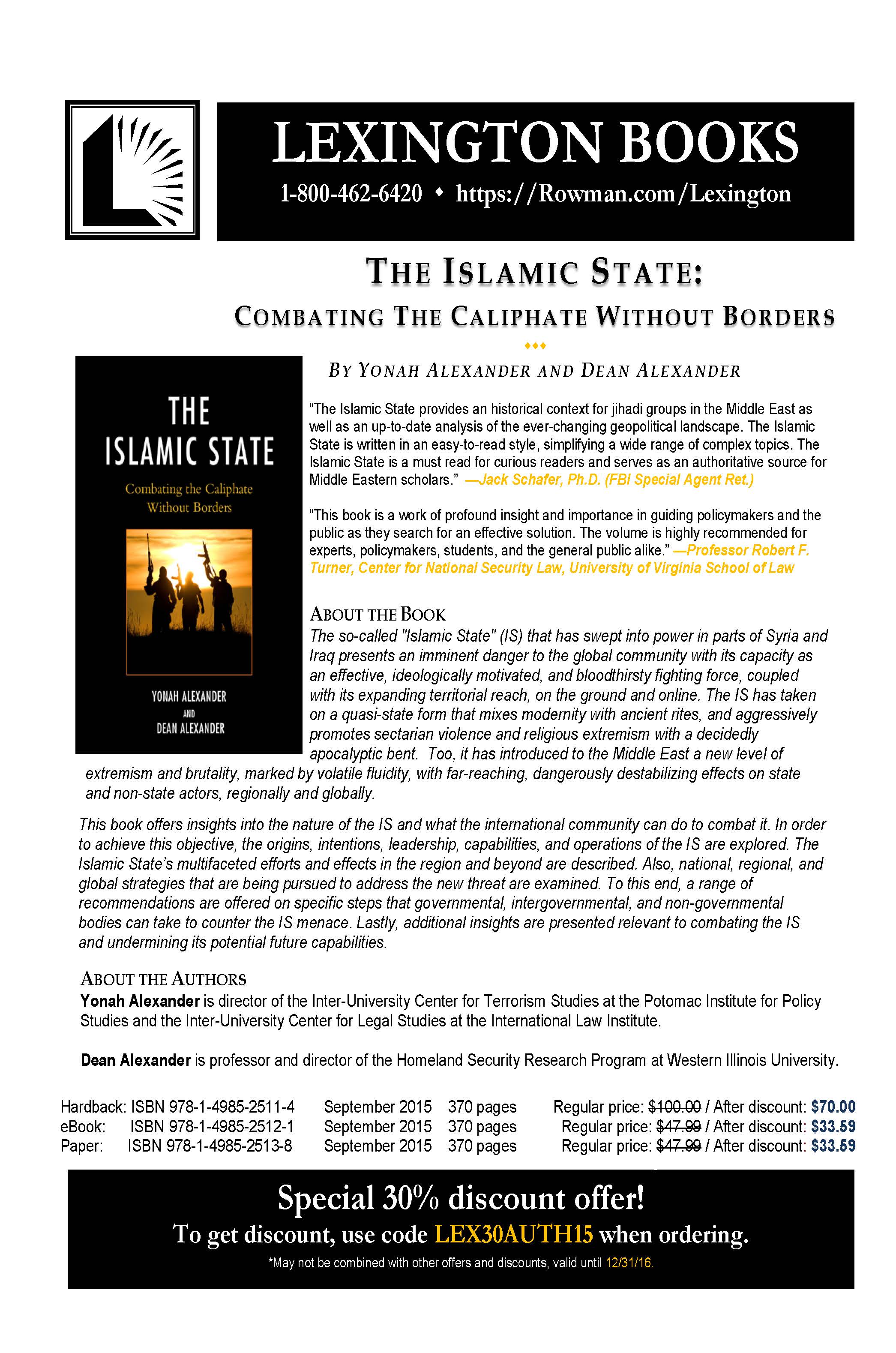
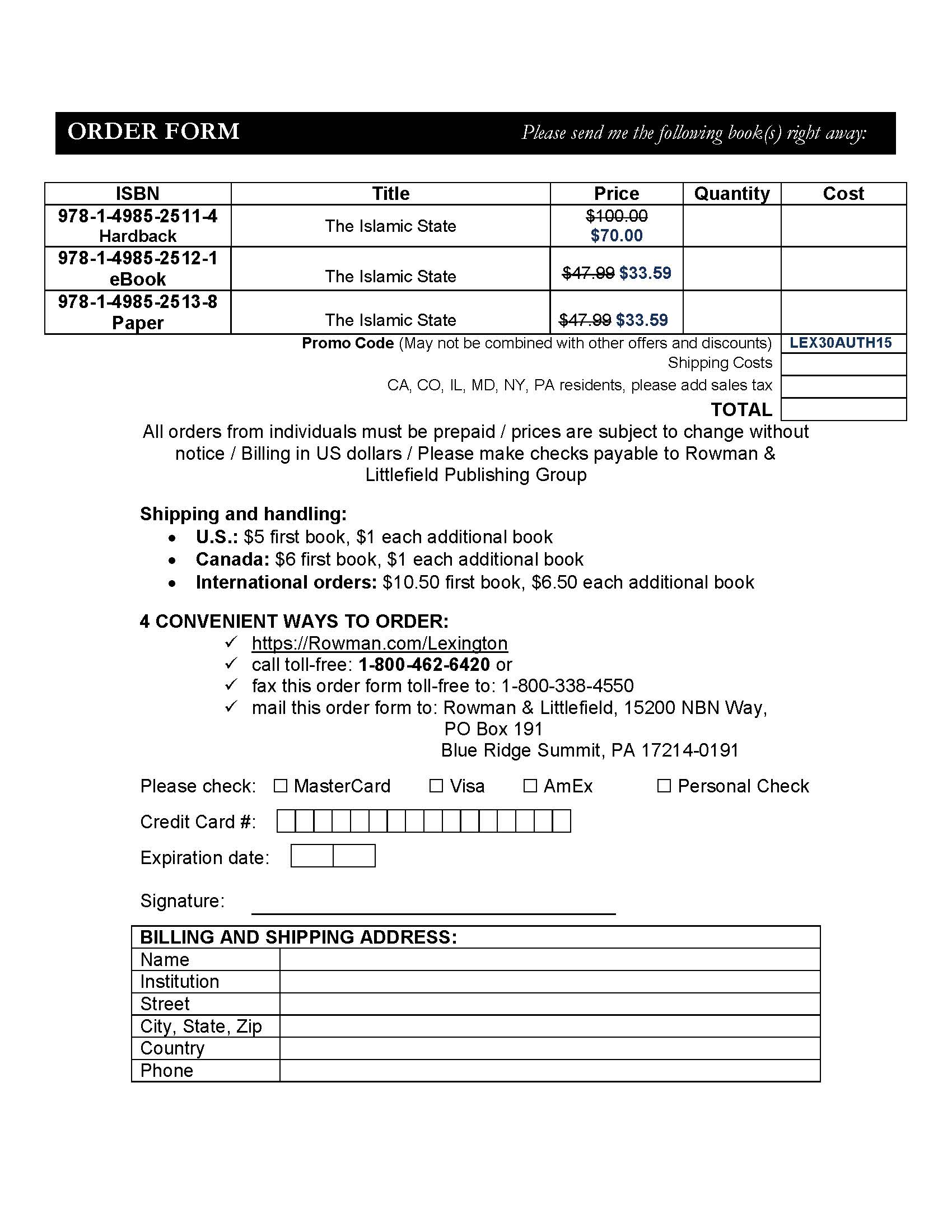
 The Potomac Institute Press is pleased to announce the latest book by Institute Chairman and CEO Michael Swetnam and ICTS Director Prof. Yonah Alexander, Al-Qa'ida: Ten Years After 9/11 and Beyond (Potomac Institute Press, 2012, ISBN: 978-0-9678594-6-0 Paperback, 454 pages). Orders for Al-Qa'ida, Ten Years After and Beyond may be placed through Amazon.com. Click here to access the Amazon listing.
The Potomac Institute Press is pleased to announce the latest book by Institute Chairman and CEO Michael Swetnam and ICTS Director Prof. Yonah Alexander, Al-Qa'ida: Ten Years After 9/11 and Beyond (Potomac Institute Press, 2012, ISBN: 978-0-9678594-6-0 Paperback, 454 pages). Orders for Al-Qa'ida, Ten Years After and Beyond may be placed through Amazon.com. Click here to access the Amazon listing.
Al-Qa'ida: Ten Years After 9/11 and Beyond follows the authors' 2001 book, Usama bin Laden's al-Qa'ida: Profile of a Terrorist Network, which came out just months before the 9/11 attacks. The new volume offers comprehensive coverage of the group’s history, leadership, financing, propaganda, ideology, and future outlook.
Here's what prominent scholars are saying about Al-Qa'ida: Ten Years After 9/11 and Beyond:
“This is the indispensable book on al-Qa’ida, its spawn, and its affiliates. Usama and many of his lieutenants have been killed, and the central “base” weakened. But radical Islam and sundry jihadi organizations live. Yonah Alexander and Michael S. Swetnam have been writing about al-Qa’ida since 1988; they have not lost their touch.” Don Wallace, Jr., Professor of Law at Georgetown University and Chairman of the International Law Institute.
“This comprehensive book on al-Qa’ida, its evolution, current status, ideology, modus operandi, and its affiliates provides an excellent source for both experts and those who want to learn about this organization and the challenges posed by international terrorism in general.” Shireen Hunter, Visiting Professor, School of Foreign Service, Georgetown University, and Distinguished Scholar, Center for Strategic and International Studies.
“Few experts on ‘jihadi’ terrorism can write with more authority on the past ten years of al-Qa’ida after 9/11 than Yonah Alexander and his colleague, Michael S. Swetnam. Many things have happened in these ten years; 2011 was an important year just like 2001. To understand what is likely to happen in the future, this book is a must read for both experts and all those interested in world peace.” Honorary Professor Ved Marwah, Centre for Policy Research, New Delhi; Chairman, India’s Task Force on National Security and Criminal Justice System; Former Commissioner of Police Delhi; and Former Governor of Manipur and Jharkhand.
“Many books have been written on al-Qa’ida, but this comprehensive volume details not only the group’s origin and background, but also its evolution into the present. Yonah Alexander and Michael S. Swetnam have produced a much needed, up-to-date handbook on al-Qa’ida and its affiliated groups. An excellent source for all those who study or combat contemporary terrorism.” Michael Fredholm, Senior Researcher, Stockholm International Program for Central Asian Studies (SIPCAS), Stockholm University, Sweden.
“This book, produced from the pens of scholars that have been wrestling with the issues for decades, should come as a timely reminder that we might want to get back to business as usual but that the likes of al-Qa’ida won’t forget us.” William J. Olson, Distinguished Professor, National Defense University.
Authors:
Yonah Alexander, PhD
Director, Inter-University Center for Terrorism Studies
Director, International Center for Terrorism Studies, Potomac Institute for Policy Studies, Arlington, VA, USA
Co-Director, Inter-University Center for Legal Studies at the International Law Institute, Washington, DC, USA
Michael S. Swetnam
CEO and Chairman, Potomac Institute for Policy Studies, Arlington, VA, USA
Member, US Senate Select Committee on Intelligence Technical Advisory Group
Former Special Consultant to the President’s Foreign Intelligence Advisory Board, Washington, DC, USA
Table of Contents:
Introduction by Charles E. Allen
Chapter 1: Ideological and Theological Perspectives
and Goals
Chapter 2: Key Leadership
Chapter 3: Selected Modus Operandi
Chapter 4: Propaganda and Psychological Warfare
Chapter 5: Al-Qai’da’s Key Networks
Chapter 6: Selected Affiliated Groups
Chapter 7: Selected U.S. Individuals with Alleged
al-Qa’ida Connections
Chapter 8: Operation Neptune Spear and Beyond
Appendices
• Selected Electronic Political Communication from
al-Qa’ida (October 2001 – 2011)
• U.S. Indictment of Usama bin Laden (November 5, 1998)
• Remarks by the President on Osama bin Laden
(May 2, 2011)
• Ensuring al-Qa’ida’s Demise (Remarks by John Brennan
on June 29, 2011)
• National Strategy for Counterterrorism (June 2011)
• Empowering Local Partners to Prevent Violent
Extremism in the United States (August 2011)
• The Honorable James R. Clapper, Statement
• David H. Petraeus, Director of CIA, Statement
By Yonah Alexander
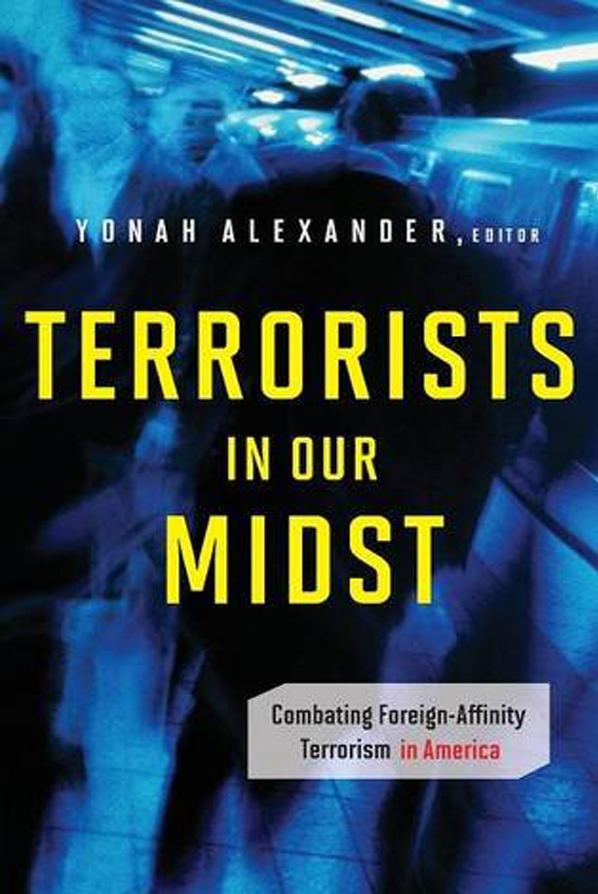 To date, no definitive study has dealt specifically with the role of American citizens in supporting foreign political, ideological, or extremist religious agendas. Dr. Yonah Alexander's forthcoming book, Terrorists in Our Midst: Combating Foreign-Affinity Terrorism in America, remedies that. In the book, seven expert authors discuss the threats to American security interests in the United States and elsewhere.
To date, no definitive study has dealt specifically with the role of American citizens in supporting foreign political, ideological, or extremist religious agendas. Dr. Yonah Alexander's forthcoming book, Terrorists in Our Midst: Combating Foreign-Affinity Terrorism in America, remedies that. In the book, seven expert authors discuss the threats to American security interests in the United States and elsewhere.
Terrorists in Our Midst focuses not only on foreign nationals operating in the United States, but also on American citizens participating in terror networks at home and abroad. The book presents an overview of both conventional and unconventional terrorism, surveys the terrorist threat in the United States by state and non-state actors, and analyzes the foreign-affinity links of American operatives in this country and abroad. Most important for the safety and security of the United States, it offers an assessment of what policies worked and what did not work, specifying a “best practices” agenda of recommendations that should be adopted by the United States and the international community. Also included are case studies and a discussion of various U.S. policies, including intelligence, law enforcement, border security, and civil liberties.
Yonah Alexander is Professor Emeritus of State University of New York and a former research Professor and Director of Terrorism Studies at George Washington University. Currently he is Director of the Inter-University Center for Terrorism Studies, a consortia of universities and think tanks throughout the world. He is also a senior fellow and director of the International Center for Terrorism Studies (at the Potomac Institute for Policy Studies) and is a co-director of the Inter-University Center for Legal Studies (at the International Law Institute). Dr. Alexander has published 95 books as well as founded and edited three International Journals: Terrorism; Minority and Group Rights; and Political Communication and Persuasion.
His co-contributors to Terrorists in Our Midst are Prof. Raymond Tanter (Michigan); Prof. William Lewis (GWU); Prof. Edgar H. Brenner (ILI); Bruce Zagaris, Esq.; Martin Sieff (UPI); and Oliver “Buck” Revell (former FBI).
Publication date: 12/30/09 0-313-37570-4; 978-0-313-37570-5; $49.95 U.S.Dollars; £34.95 Sterling
20% Pre-publication discount: $39.95 U.S. Dollars; £27.95 Sterling
To order or for more information please contact:
US Contact: ABC-CLIO
Call: 1-800-368-6868;
Fax: 1-805-685-9685
Online: www.abc-clio.com
Orders by email: This email address is being protected from spambots. You need JavaScript enabled to view it.
Marston Book Services Ltd
160 Milton Park, Abingdon OX14 4SD, UK
PO Box 1437 • Oxford, UK OX4 9AZ
Tel: +44 (0)1235 465500
Fax: +44 (0)1235 465555
This email address is being protected from spambots. You need JavaScript enabled to view it.
© 2024 Potomac Institute for Policy Studies

